#that means that there was a fundamental flaw in how the group is structured and/or how it's organized and planned for
Explore tagged Tumblr posts
Note
I wish more groups and companies would be serious about sub units. If they actually put thought and effort jnto them they can be a success and help bolster a group. Someof loonas most popular songs are from odd eye circle. Seulgi and irene offered a fresh and exciting style we havent seen red velvet tackle. Even chocome had people cracking up with super yuppers Acid angels of asia has a solid mini id like kepler and nmixx try it. Not every member fits their concepts id like 2 see their strengths
lsdkfjsdlkfjlskd i literally just posted an ask like last week where i said that i don't care about subunits, so you're falling a bit on deaf ears with this one bc i don't think they're necessary for any group that doesn't have a rotating concept like nct
#if your group is large enough that you can make subunits out of it: it's too big!#said it before and i'll say it again: five people is the ideal group number!!#also a subunit will not save a group that can barely put on a good performance. if it does -#that means that there was a fundamental flaw in how the group is structured and/or how it's organized and planned for#also for the record i dont necessarily agree with the nct format BUT sm knows to keep the actual unit numbers down#and only has them all together for very specific instances and they are usually not performance or music based#kpop questions#text#answers
3 notes
·
View notes
Text
The problems with the 'infighting' comic
So I deleted the infighting comics. Fundamentally, the reason why is that I think I did a bad job with them. Clearly this wasn't a popular decision, and I did say I'd elaborate on why when I had time, so let's talk about the problem with the infighting comic.
Just to get this out of the way, the problem is not that the 'wrong' demographic liked it, or anything of the sort. What I don't like about the comic, and what keeps coming up, is that the way I frame it and how I execute the attempt at doing something with the never-ending churn of Discourse in the queer community is that it:
Fails to state what I think the problem is. "Infighting" is vague, it can mean basically anything, and unfortunately a very common use of the term is "literally anyone in the community criticizing anyone else in the community for any reason whatsoever." The comic fails to do anything to communicate whether this is the intended reading or not. This is a problem because the most common targets of bad-faith infighting accusations are also the most marginalized in the community, and the fights start as completely unjustified backlash to marginalized people criticizing marginalization.
The comic doesn't sufficiently communicate the intended idea that these are marginalized people with actual problems. The complaints of the characters come off as trivial due to how they are only presented in an oppositional context, with no frame of reference given as to whether their complaints are equally legitimate, whether one of them is right and one is wrong, or whether they're both just saying some nonsense. This is a fundamental flaw in the premise, because depending on which real-life situation the reader assumes it's about, the entire meaning changes. Regardless of what I say I actually intended this is bad enough that by itself, it drags down the whole thing.
The framing that the bigot character doesn't care about the difference between the groups. This only works if you're operating under the assumption that the comic is talking about groups that are routinely conflated by bigots, which at the very least is a detail that should be clearly stated in the premise, not in the second comic, and again leads to a very artificial framing of the supposed "infighting."
The main character being presented as a neutral observer with no stake in the argument themselves is weird.
The follow-ups do very little to address any of the above issues.
The comic is spread over four separate posts, which means even if the above issues were meaningfully addressed, the circulation of parts of the comics without those problems dealt with would continue, with all the problems retained.
There are more criticisms, and I am not going to argue with them because I don't want to defend the comic as I made it. I don't like it. I am tired of seeing the arguments that come from it. I apologize for how it was made, and I will not attempt anything to replace it until I can meaningfully address the problems with it.
There are additional structural problems with the Pills That Make You Green comics that have become more and more apparent as I've kept making them. I think failure to meaningfully address these issues is going to keep causing comics to fail in similar ways, and so I am thinking that a serious change to how I approach these needs to happen if I even want to make them anymore.
376 notes
·
View notes
Text
Stede in Season 1
After seeing some rather awful bad faith takes flying around after 2x7, I'm throwing out a beginning defense of Stede Bonnet (loml). It seems insulting Ed's fish is the worst thing that anyone has ever seen, and it really seems to be a continuation of anti-Stede sentiments within the fandom and viewing him as a prop for Ed (and sometimes Izzy) rather than his own character. Fanon Stede is ever patient, ever kind, ever devoted to his partner, and I'm seeing a lot of shock that Stede is a flawed, imperfect person with his own needs, that he says things in the heat of the moment, that people are seeing a less interesting character than what DJenks and friends have created. Stede's a fucking lunatic and I like it.
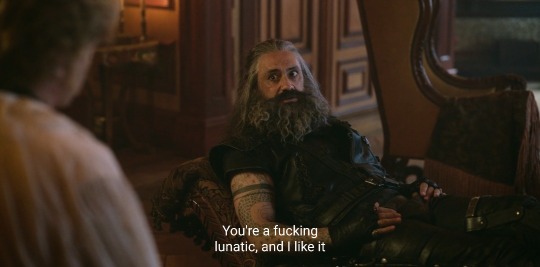
I'm going to break this into a few posts as I ramble on to the end of 2x7. I have big thoughts on the ending, but I need to lead up to it! I am going to try to be as brief as I can up to the lead up, but I'm not happy with certain parts of the fandom right now (it's just a spat, love you all).
(If you haven't seen the "I hate Stede!" and "I'm so mad at Stede!" posts after 2x7, I am so, so jealous of how you have curated your social media experience.)
Part 1: Season 1
I'm going to note first that this is really a more rambly companion piece of this:
In time budgeting, most of Stede's character introduction and motivations are built into 1x1 through 1x3, but you all know it is a common refrain of these episodes: "Just wait for episode 4!" (OK for newbies, but huge side eye from me with people who have watched multiple times.) Episode 4 is when Act 2 of 3 of Season 1 begins. The foundations of the story have been laid, the cast has been fully assembled, and we enter the rising action (i.e., the meat) of the story in 1x4. It is not that Blackbeard alone improved everything: it was the story structure itself that shifted.
Preferring Act 2 (ep 4 to mid ep 8) and saying Act 1 was bad and "boring" is a disservice to the story and really robs yourself of the payoff action in Act 3 of Season 1 (and now Season 2), in particular with regards to Stede's character. It's a TV show, so you don't have to like all parts or watch it equally, but if you're going to criticize Stede and what he does, you can't ignore the part of the story that tells you the why of everything.
For example, we see people saying Prince Ricky is "exactly how Stede used to be!". Episode 3 disagrees.

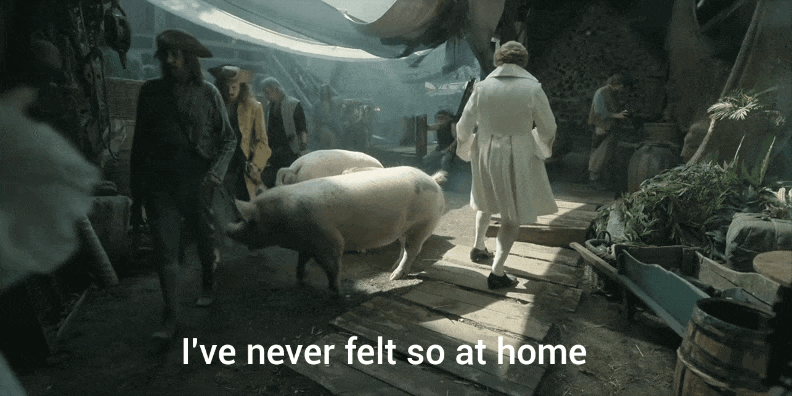

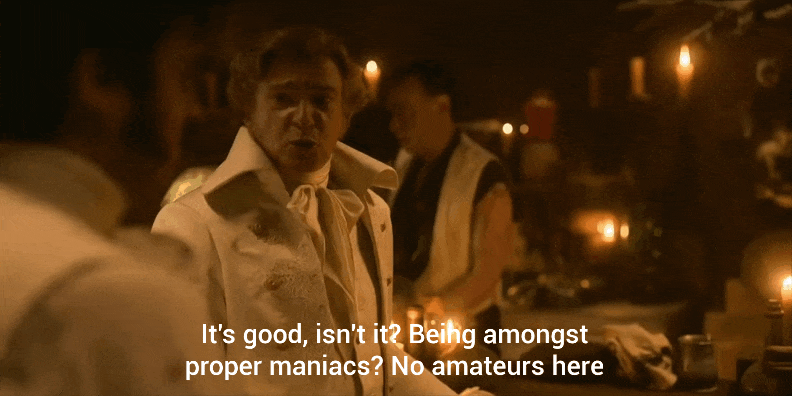
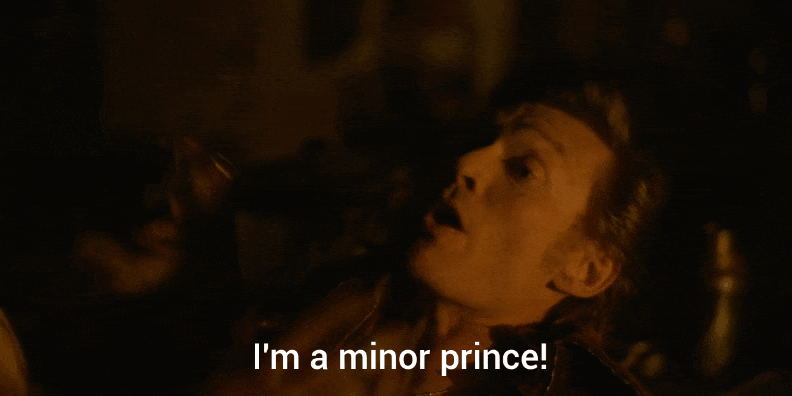
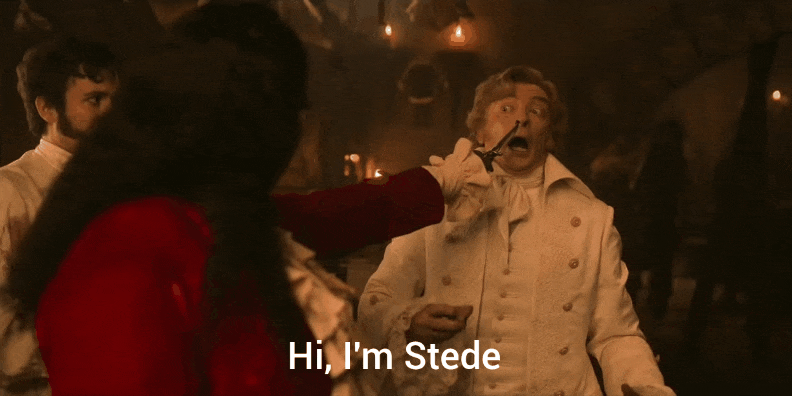
Ricky is some Evil Star Trek Mirror Universe version of Stede, and they have fundamental differences in their view of piracy, which feeds into the action of the tail end of Season 2: Stede wants to be part of the piracy world, but Ricky thinks he's above it. The few hours in 2x7 that Stede spends enjoying being cool in the Republic of Pirates is overall sweet (sliding past the murder, lol), not a relationship red flag or Stede being a dick. If you tried to join a group and they finally embraced you, how would you initially act? Being excited for a few hours does not mean Stede has made a forever commitment to piracy and not Ed.
But, I digress. To me, Episode 2 (along with 6, 9, and 10) is far and away the peak of Season 1. We see the crew bonding (and those unique interactions are missing in Season 2's truncated runtime), and we get a deeper look into Stede's head: his initial naivety toward violence, his insecurities, his unique captaincy style and problem solving. If I look at just his insecurities, Badminton's Ghost is Stede talking to himself (like Hornigold was vocalizing Ed's feelings in 2x3). Stede is harsh with himself about his abilities and maturity, and we even see that he took Badminton's petty body shaming in 1x1 to heart.

(Oh, I have thoughts on Stede finally being told he's pretty and then instantly dumped!)
But he continues to degrade himself.
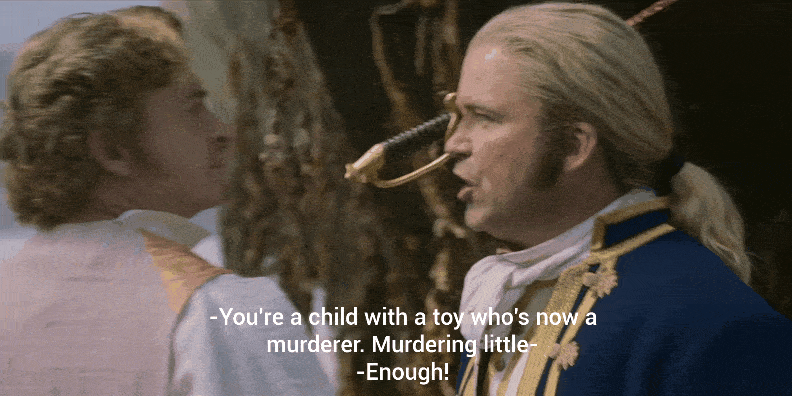
"You're a child with a toy" Stede says to himself. Compare this to Ned Low calling him a "bumbling amateur" in 2x6. Real people voicing these thoughts (like Chauncey in 1x9) messes Stede up.
The local therapist clearly lays out the motivation behind 1x9&10, and Stede still continues with the negative self talk.
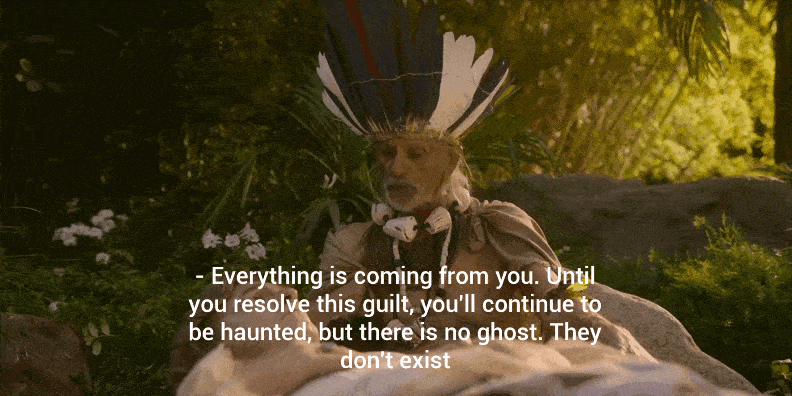
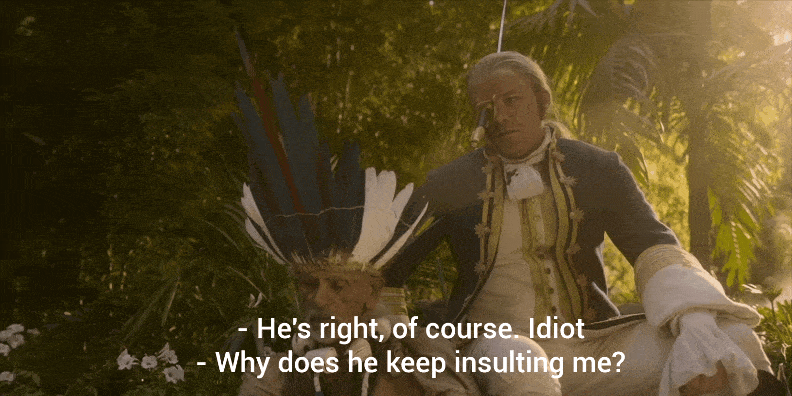
And then we get the best mantra!

Yes, baby! You can only be as good as you can be, and you deserve the world.
Stede does not banish his guilt that is haunting him, but Ed comes in at Episode 4, and any more serious feelings is all about Ed.


(Second GIF is a joke. I know it's important to Ed's character. Plz, don't be mad.)
Ed is the deuteragonist, and the story now needs to spend time establishing Ed's character and motivations. This doesn't make Stede's go away, but if you only watch Episode 4 and on, that's what it looks like. There are brief moments of Stede's vulnerability and guilt from then, but not much.
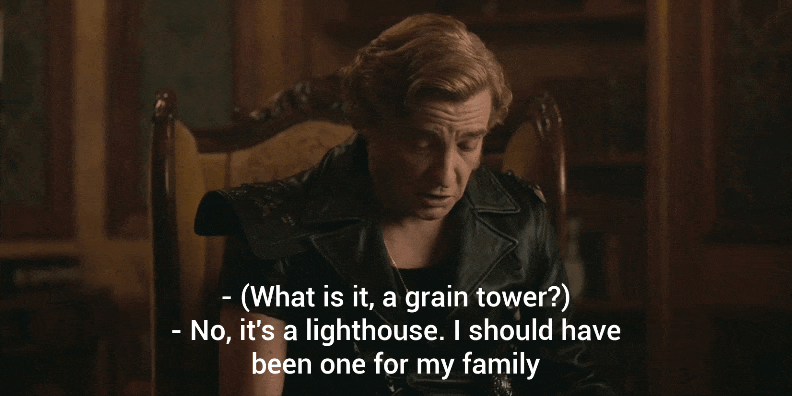
(Side note from a Midwesterner: I've spent too much time finding out if "grain tower" is colloquial for "grain silo" somewhere, and I still don't know.)
Ed and Stede just met here. Ed isn't absorbing much of Stede's comments (Stede also feels trapped, Stede has family guilt, etc), but it goes the other way, too, doesn't it? Stede is recovering from his gut-stab, they're still in a life-or-death situation, and Stede is still feeling his guilt (and just saw more guilt ghost hallucinations). Registering and internalizing what Ed is saying doesn't take priority.
And they enter their cute early relationship phase: They have fun together! They can easily talk to one another! Stede easily forgives Ed wanting to kill him!
Again: in between all the cute and fun, all the heavy stuff is about Ed. Stede deals with the aristocrats who mocks Ed. Stede is gentle with Ed's red fabric. Stede listens to Ed's past without judgment. Stede openly accepts Ed as a friend. We don't see Ed engaging with Stede in a reciprocal manner.


(I was so delighted when Stede called some of this out in 2x4.)
Stede is a few steps behind in their relationship: He doesn't know it's a romance. He doesn't know he was flirting with Ed. He's not immediately understanding what the Act of Grace was to Ed (hubby commitment!) as he's having his Nigel guilt, family guilt, and being seconds away from death swamping him all at once.
In the academy, Ed isn't even listening to Stede. He's moved onto his domestic marriage role while Stede is dealing with his demons.

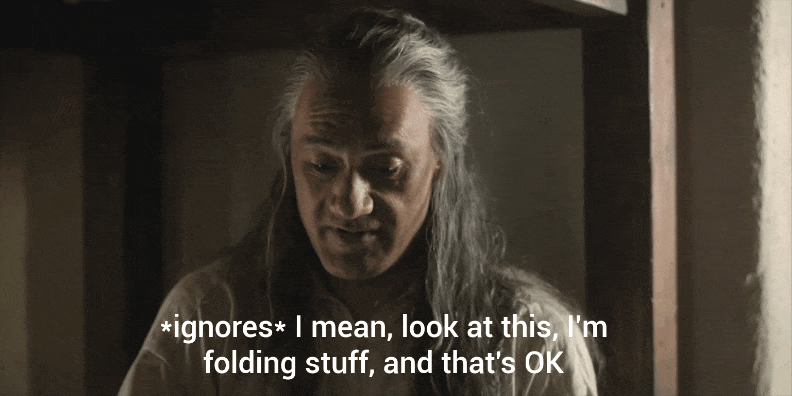
With 2x7, I see people saying, "Ed was very clear in wanting to leave piracy!" If he was speaking to someone fully engaged with him, I would agree. (That also doesn't make Stede having a few hours' fun the worst thing ever.)
(Aside of what I see below: In Season 2, I see overwhelming praise of Ed and Izzy's performances and very little on Stede. This is not to disparage TW or CO, but Ed and Izzy are more in-your-face and obvious with what is going on internally in their scenes and they are nailing the drama scenes. However, Stede becomes quieter, shutting down into himself, when having high feelings, and RD's acting is very subtle and very beautiful in these moments.)
In The (First) Kiss scene, Ed is clear! He just wants to be Ed, and Ed is happy just being with Stede.

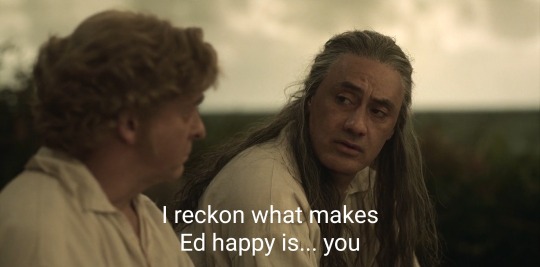
But look what Ed walked in on:

Ed is saying things, but Stede is trying to process big feelings of his own at the same time. Stede is there self soothing, still thinking about what Ed ignored him about in the bunks. "How are you handling things so well?" means Stede isn't handling it well. Ed is excited, but he (and apparently some of the audience!) is brushing off all of what Stede is saying while expecting Stede to take to heart everything that Ed is saying. (I mean, the beginning of S2 shows why Ed is so excited for this life change, but it is frustrating!)
If you only feel bad for Ed at the end of 1x9, please try to imagine Stede's perspective: suppose you have low self worth and are consumed with guilt about people you've hurt and then are seconds away from death twice, are you going to be thinking clearly and prioritizing (and recognizing) the feelings of a guy you've known for a few weeks and didn't know you were dating?
Stede has drawn inward this whole conversation. His answers turn monosyllabic, and his body language turns more and more panicy as the heavy reality of everything sets in.
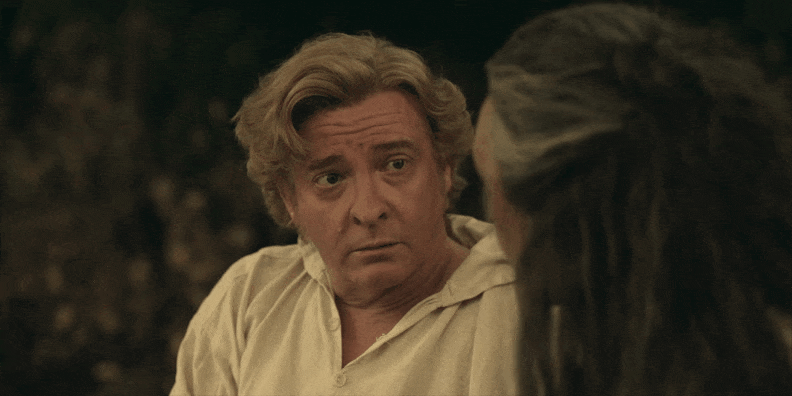
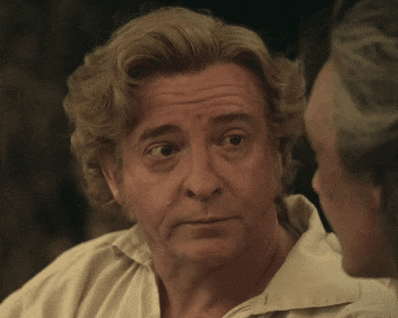

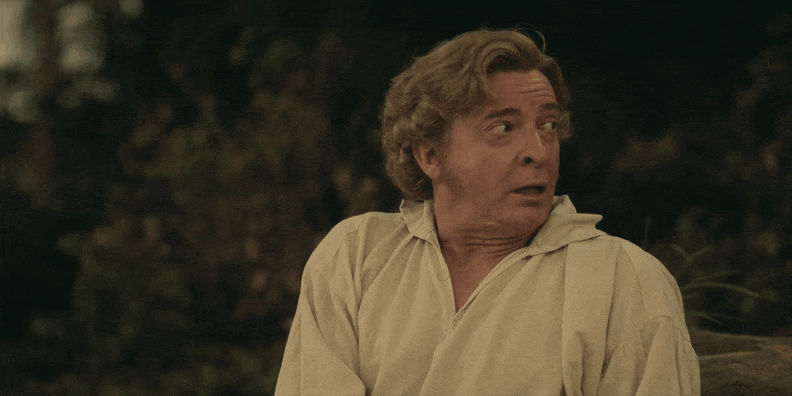
Stede enjoyed The Kiss, but was this the appropriate time for him? (Like Ed enjoyed The Sex, but was that the appropriate time for him?) They aren't in sync yet, but that doesn't make one party's feelings more valid than the other's or one party evil for being a bit ahead.
With 2x7, I don't know why people thought Stede should be a mind reader and be able to quickly piece together a few statements Ed made while Stede was mentally drowning.
I think it should be noted that as of the end of 2x7, Stede is the only crew member who hasn't had mental reflection and/or therapy in Season 2. He realized Mary, Alma, and Louis didn't need him and he was in love with Ed in 1x10, but the voice calling him a child with a toy, an idiot, weak, and ugly is still there.
Continued in Part 2! (Still to come...)
#stede bonnet#stede did nothing wrong#our flag means death#ofmd#ofmd s2#ofmd 2x07#ofmd s2e7#blackbonnet#gentlebeard#ofmd s2 spoilers#ofmd spoilers#rhys darby#Baby's first attempt at GIFs#ofmd meta
206 notes
·
View notes
Note
may i ask what "two jews three opinions" means? or where might i go to learn about the phrase?
It's a quip--often used by jewish people--that references the very long history of "Judaism is fundamentally rooted in the idea that you debate God and what Judaism means". Two Jewish people can have radically different and completely incompatible/irreconcilable opinions on Judaism. There is an entire structure of debate based on arguing about different interpretations of the Talmud.
The best example I think I can give you as a gentile of how radical I mean is that you can be a complete atheist and also be Jewish not just as an ethnic group or cultural connection but as a member of the faithful. Straight up.
It's this sort of thing which frustrates me, too, because it's very indicative of how flawed antitheism is. Antitheism is always going to be fundamentally racist + antisemitic because it is against the idea of religion as a concept, but that's like saying you're against food as a concept when the reality is, no, you don't like cheeseburgers and you're acting as though all food is cheeseburger-based.
224 notes
·
View notes
Text
"Justice For Kaixa" is the rawest depiction of trauma in Tokusatsu History.
Hello, I am Wil Justifaiz and this is my first ever attempt at structuring something for Tumblr so please be patient with me. Faiz has been my favourite show in all Tokusatsu, maybe my favourite piece of television ever, despite is very notable flaws. The story of finding your place in a world that refuses to accept you and will villainize you, that will treat you like a monster no matter what you do, the story of overcoming trauma that Faiz represents really speaks to me.
Every single character in Faiz is a victim of severe trauma that shapes their story throughout the entire show but none of them manages to foil and progress the show in the way that Masato Kusaka does. In my completely honest opinion, Kamen Rider Kaixa is the best anti hero the franchise has ever seen and no other character has ever managed to even remotely capture the complexity of his character. A complexity that is on full display in his focus episode, Episode 37: Justice for Kaixa
//SPOILERS FOR THE ENTIRETY OF KAMEN RIDER FAIZ!!!
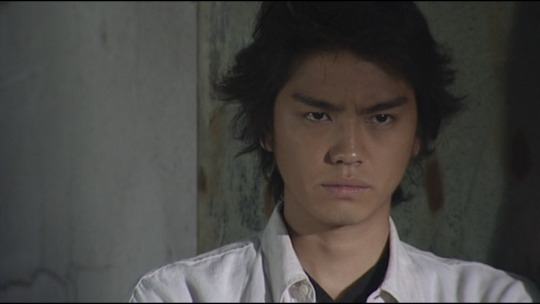
Justice for Kaixa takes place shortly after Takumi's secret identity as an Orphnoch is revealed to the rest of cast, an event that fundamentally shakes up the dynamics of the tightly knit friend group that Faiz is known for. The episodes prior to this primarily focus on how this impacts Takumi's relationships with Mari, Keitaro and Yuji as they all struggle to truly adjust to this change. However prior to this episode, there is very little exploration of what Kusaka, Takumi's biggest detractor and the primary hater of Orphnoch's, thinks beyond it just being a justification for his hatred. This is addressed directly in this episode as Justice for Kaixa serves as an explanation and an elaboration of WHY kusaka is the way he is, why he has all those unexplained quirks and why he tends to get defensive and begins to gaslight people whenever he feels like his control over a situation is questioned.
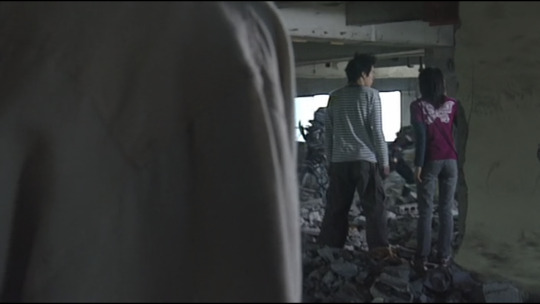
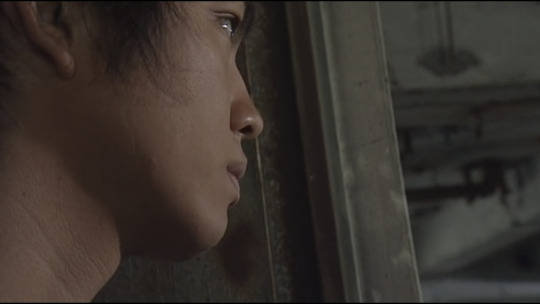
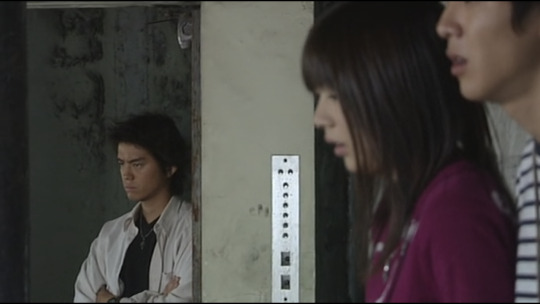
During the following conversation with Kiba, Kusaka accidentally slips up when talking about Takumi, his hatred of Orphnoch distracting him from the possibility that Mari and Keitaro could take offense from that. This is unusual of the always reserved and calculated Kusaka who tries to always appeal to Mari and Keitaro in order to sustain a social control over them, something which shows to us as the audience just how deep Kusaka's hatred of the Orphnoch goes. But why...

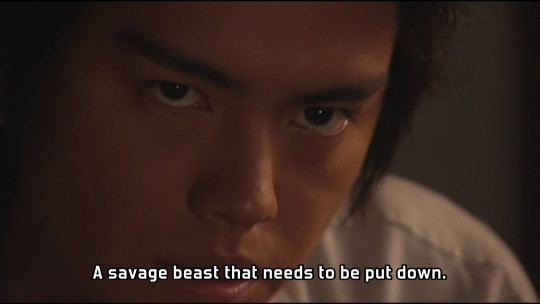
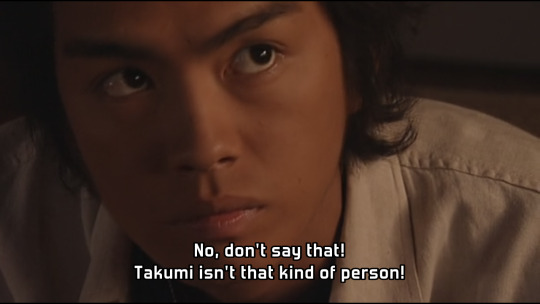
Kusaka during the rest of the scene tries to reassert his dominance over the discussion by comparing Takumi to Sawada, even if his point is very much false, something he may or may not be aware of (depends on how you interpret his view on orphnochs, he could genuinely mean this, I am not sure), however Kusaka's logical stance and well worded points that directly draw from Mari's personal struggles is exactly what Kusaka thrives on. The reason he gets away with everything he does in the show is because he can CONSISTENTLY make a good case for himself and KNOWS how to justify his place there depending on who he is talking to. This is Kusaka's strong point, the core of Faiz's drama and THE MOST IMPORTANT DETAIL OF KUSAKA'S CHARACTER THAT SO MANY PEOPLE GET WRONG, Kusaka's need to be in control of everything in his life is the DIRECT RESULT of his trauma and it's what shapes him into the toxic and controlling piece of shit that he is. (and why I really like his writing 98% of the time.) Kusaka, as well worded as his points were, slowly comes to realize that, he didn't succeed in persuading Mari that Takumi needs to die. This is the set up to what I believe to be the best depiction of trauma induced panic attack that I've ever seen in a piece of media. Mari calling Takumi even if Kusaka's told her to stay away is what makes Kusaka realize he is losing control over the situation, a situation which hits VERY CLOSE to the most traumatic moment of his life.

The next shot we see of Kusaka is him aggressively cleaning his hand, a trait that he has displayed ever since his debut, as he mumbles in frustration as to why Mari can trust an Orphnoch so willingly, the very thing that got them all killed all these years ago. Kusaka is very much aware that Mari has no recollection of the event but the irony of it all, how she shows such unconditional love to the very thing he has been trying to protect them from just sets something off in him. Along with that Kusaka begins to feel frustrated that all his efforts to impress Mari, the only person Kusaka seems to have any real feelings of affection for, the only person who Kusaka is willingly to do anything for and the only one who he desires affection from, is seemingly betraying all his efforts without even acknowledging ANY of them. This is the part of the essay where I need to point out, Kusaka's entitlement to Mari's affection is OBVIOUSLY a toxic trait that is very much KUSAKA'S FAULT, just because I will rationalize WHY he has this tendency doesn't mean that Kusaka is JUSTIFIED in any of this. Kusaka's mommy issues and desire for Mari's affection often times has Kusaka disregard Mari's feelings for the sake of comforting himself. Kusaka isn't exactly an incel like Micchy gaim but his unhealthy obsession with Mari is very much a fundamental character flaw.

This is where it happens, one of my favourite scenes in the entire genre, Kusaka PTSD triggers as we finally receive the pay off to his little hand washing quirk as the blood of that night is covering his hand. Seeing this scene for the first time gave me chills, everything about the way things unfold, the score setting in the panic, the build up to it, the eventual "jumpscare", the incredible directing work and of course the highlight that makes it all work together so nicely, the sheer horror in Kusaka's face, an absolutely phenomenal performance by Kohei Murakami that manages to PERFECTLY portray just how scary this hallucination is to Kusaka, just how desperate he is to suppress that night from his brain. All of it is simply brilliant. The show does not try to soften or stylize or shyly draw an allegory to it, Kusaka's panic attack is raw, it's scary and it's very real. They did not shy away from showing just how helpless the all powerful and calculated Kusaka becomes during these episodes, being "reduced" to a screaming and panicked mess, lashing out at his surroundings as he smashes anything his way in this panicked state, trying everything in his power to convince himself that this night never took place.



The scene is chaotic, Kusaka violently trying to scrape the blood of his hand but no matter how hard he scrubs it the blood just won't come off, he fidgets he tries to look away, his breathing becomes heavy and erratic, the sharp violin and the thuds keeping you at the edge of your seat as we see this character who has always been in control breaking down as all his efforts accomplish nothing. No matter what he does, nothing will ever scrape off the warm, crimson blood from his hands and that is terrifying. It's a constant reminder that no matter what Kusaka attempts he will never EVER be able to overcome this event, he will never be able to clean off that blood from his hands. This scene explains EVERYTHING about why and how Kusaka is the way he is, this moment of sheer panic ends as abruptly as it started but it's message is still clear, the blood is something only Kusaka can see, a trauma he can't clean off, even if it's not visibly there anymore, his hand will never be rid of the blood it touched that night, Kusaka will NEVER be able to get rid of what happened to him that night. That's what makes Kusaka's character so tragic, that no matter what he does, he will never find peace.

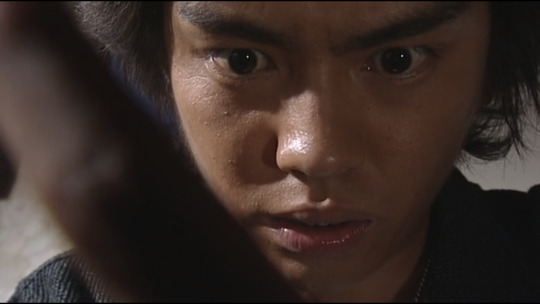

Even if his hand is clean, Kusaka has been so shaken up by this very moment that he is still manic and unable to compose himself no matter how hard his tries as his panic attack continues. Kusaka looks disgusted and completely shaken up during this entire sequence as he gets up and begins to just smash shit up before he spots the only other thing in existence that acknowledges that he was there that night, the poster with his name written on it. Nothing and no one else in the entire world knows what happened but that poster, the only thing that forces his to acknowledge that night AND THUS if he destroys it, then nothing else can force him to acknowledge that night. The way Kusaka drops on the floor as he desperately tries to erase his name from the poster with a box character almost makes you feel bad for him because he isn't angry, he is desperate and that's what makes it feel so sad. Kusaka is reduced to a complete mess that is completely alien from his usual self because of how debilitatingly traumatic this memory is for him.

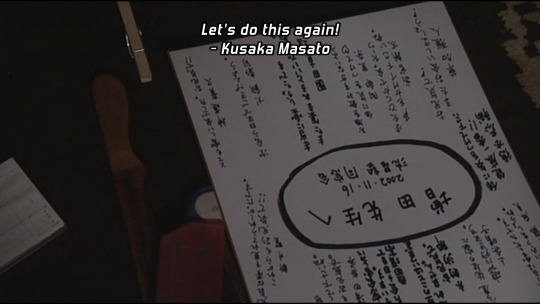

The roughness of how he gets to cutting up the poster is pure directing brilliance that is exclusive to it's time, the very wide shots that make Kusaka look small, the way Kusaka can't even compose himself to place it on the table, throwing everything around in his attempts to place it on the table, the messy and very rough attempt to tear out his name. All of it is genuine scary and sad to watch.

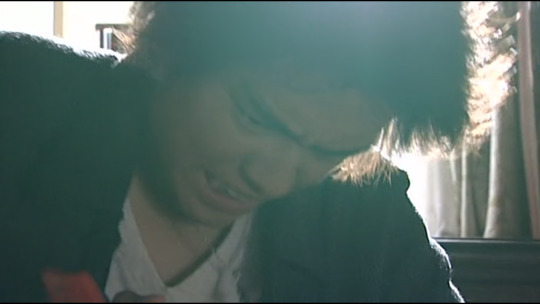
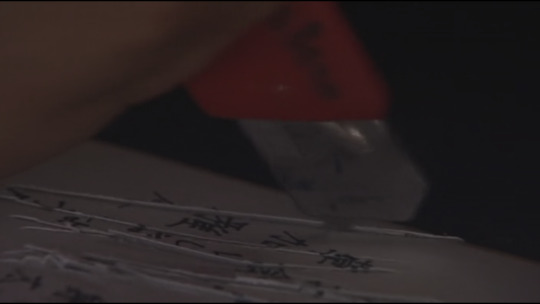
Mari catching him during this episode is another great choice to really add onto just how hard it is for Kusaka to control himself during one of these episodes, Mari confronting him as he fails to properly compose himself for long leads to one of the only moments where Kusaka gets violent with anyone that isn't an orphnoch, Takumi or Yuji as his composed and friendly facade COMPLETELY dissipates when confront with his trauma. Not even Mari, the most important person in his life is safe from this need to repress that memory at all costs. This shows Kusaka's need for control in full display because it provides us with the reason, Kusaka losing control of a situation reminds him all too much of that day where he was too helpless to save Mari or himself. Kusaka's need for control is a self defense mechanism, that night left him incapable of ever being vulnerable again whether its socially or physically, Kusaka is a character which every bit of his backstory serves as a reminder to the audience that this is a man who has gone through INDESCRIBABLE trauma without ever receiving any professional help to mend his broken psyche. This is why I find myself able to like Kusaka's character because, even if his actions are unforgivable they are all very rational once you understand who he is and why he is like this. Kusaka is an asshole who was forged through trauma. A narrative that often gets overlooked in recent media is how not every traumatized character is innocent and soft and just needed a big ol' hug to become a good guy. Don't get me wrong, I love characters like that too but Kusaka portrays a really ugly truth that genuinely makes me question why he is such a rarity. He is a traumatized person that never got the help he should have received, he never resolved his traumas and if I may mention a previous episode, his only guidance in life, his adoptive father enable and directly leads him into his path of self destruction, a topic I could and probably will go on about in my inevitable Kusaka deep dive, however the core of this message is how Kusaka is a bad person because he never resolved the issues he had, he never got the help he needed and he has never felt safe since that day, his entire life is a series of unfortunate events. A lot of people forget that Kusaka is an orphan as well, the reason he cares for Mari so much is because she provided him with the protection that he was looking for from his deceased(or maybe she just left him) mother.
Kusaka is what happens when a traumatized person never finds a way to healthily resolve his problems, that gets encouraged to indulge in his darkest thoughts in order to feel safe. This is what makes him such a perfect foil and anti hero. Takumi is also traumatized and yet, while takumi resolves his issues by finding people that will unconditionally love him and bonding with others like him while Kusaka isolates himself further and tries to find a way to be above others so he doesn't get hurt.
This is also why I get so pissed when people call Kusaka a villain, he is very much not that. A big part of kusaka's appeal to me atleast is how he is an anti hero because, much like you and me, he is a normal human. He isn't some sort super villain, he consistently fights for a just(on paper) cause, he is a hero who is a bad person. That's what makes him so unique. He is a bad person that isn't evil.
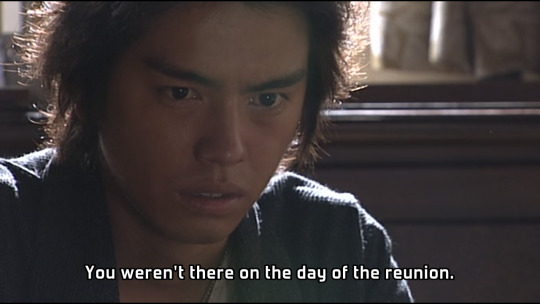
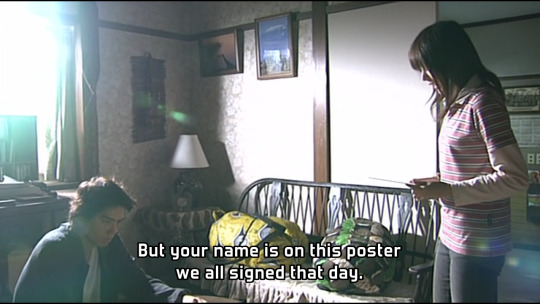
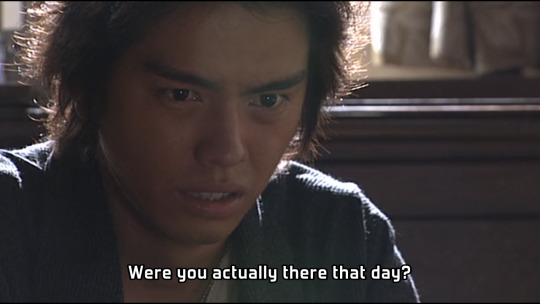
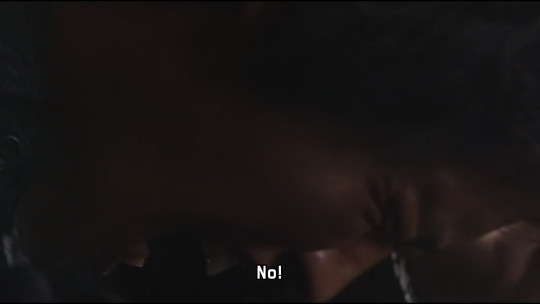
I'm running out of images so I won't go into as much detail about the rest of the episode + this is what I wanted to talk about mostly but yes, Mari telling Kusaka that Takumi could be the orphnoch that ruined his life is a vital piece of information that in his mind justifies all his hatred against Takumi but in order to assure this theory he needs to calm down, this is where we see Kusaka slip back into his usual persona to ease Mari into sharing the information he needs.


The drama sparked from this episode is just phenomenal and the character work it does for Kusaka is equally as good, I do heavily suggest to people that feel like they still don't fully understand Kusaka to take a look into his 2 character songs, Existence~KAIXA-nized Dice and Red Rock. Both of these songs delve deep into Kusaka's ideology, Existence explores his belief that only he knows the reality of the world, that only he can change fate for he is the only one who is truly "aware". To simplify it, Kusaka sees himself as the main character and everyone else is an npc he has to befriend or take down, that only he knows what's best. Meanwhile Red Rock explores Kusaka's need to be the victor in the end along with the previously stated inability to be vulnerable around others, in a world where people can betray you, Kusaka finds it impossible to confide in anyone for he may be caught of guard and be hurt once again by it. Kusaka wants his peace and does not trust ANYONE to help him with it. So until he wins, he will keep on fighting, he will fight until he has full control over fate itself. That's what makes Takumi such a good foil for him, because Takumi questions said authority while displaying no real drive of his own. It's a fight between the most driven and determined man who is set on revenge vs a man who has no ambition beyond maybe seeing tomorrow. Their rivalry is peak.
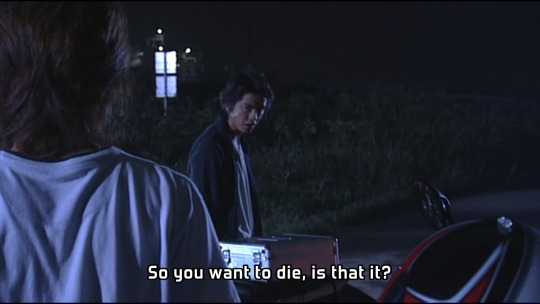
The reveal of the blood not being shed by Kusaka and instead being Mari's blood that Takumi supposedly shed is just a great touch, it recontextualizes Kusaka's protectiveness of Mari during the events of faiz while being a genuinely shocking and REALLY well shot scene.
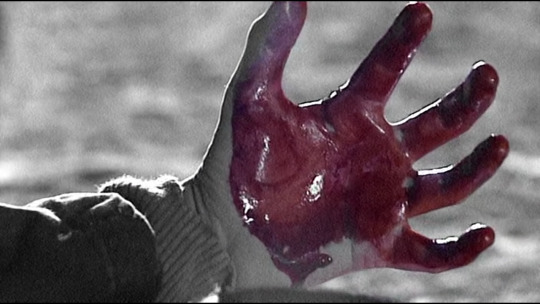
The episode ends in Kusaka trying to resolve his problems by avenging mari's life along with his. In his mind executing Takumi is the only way he can find peace as he prepares to kill him, only held back by Yuji's attempt to rescue Takumi.

This episode is quite honestly one of my favourites in all tokusatsu and what makes Kusaka go from just an asshole that brings forth REALLY GOOD drama, to a tragic, three dimensional character who I can understand and empathize with while rooting against him at every turn. He is truly the most nuanced anti hero in the franchise and there will never be a character like him. I'm so glad that Kohei Murakami thinks so too, often referencing his role as Kaixa and celebrating KAIXA-day every September. He is a one of a kinda character that I genuinely think people should genuinely take another look at and try to see more to him that just how much of a dislikeable asshole he can be. How kaixa's belief that he determines fate is the grave act of hubris which leads to his eventual demise... Thank you all for reading! Faiz is my favourite piece of tokusatsu to ever come out of Toei and it means a great deal to me. I only now realized I never took a deep dive of it before so I thought I should give it a go by analyzing one of my favourite episodes. If you liked it please let me know, I really appreciate all the support! Also kusaka in my mind is 19 and no ancient site from 2003 can convince me that he is actually 21, that's stupid and weird. THANK YOU, BYEEEE!!!!!
#Faiz#Kamen Rider#Kamen Rider Faiz#Kamen Rider Kaixa#Kusaka Masato#Kusaka Faiz#tokusatsu#kamen rider essay#wil justifaiz#justifaiz#kamen rider 55
101 notes
·
View notes
Text
How come we are so fucked: the decline of modern democracy
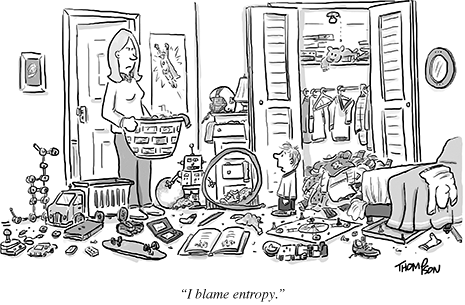
The second law of thermodynamics states that the level of disorder in any closed system cannot decrease. Unless there's some external influence, things can only get more and more messy. The earth is not, by any mean, a close system, and therefore neither the biosphere nor human activities are in fact directly governed by the second law in the strict sense. Nevertheless, we can still formulate a version for this law of nature that is applicable to human societies: without a focused intervention everything shall get worse.
A democratic government is a synthetic thing. It was made; it didn't just evolve. The first system for a modern democratic rule was set up in the US of A during the late eighteenth century by its founding fathers. It was based on ideas by liberal European thinkers such as Locke, Rousseau and Montesquieu. Although the US was hardly a true democracy then – it legalized slavery and assigned voting rights to white men only – the system it procured still served as a template for all modern democracies hence: parliament, government and head of state (and potentially other public positions) elected by the general public according to the majority rule.
There is no perfect system of government. The US Americans, for instance, tried to construct a fair system, but it was rather naïve and it still contained many loopholes that could be exploited by some groups to increase their own political power on the expanse of other groups. Moreover, when certain people become powerful due to flaws in the system, they use this power to enlarge end deepen these advantageous defects, gaining even more power, and that allows them to increase yet again the inherent unfairness. This dynamic is common to all forms of government, not just in the US: barring a dramatic disruption or, alternatively, a continuous effort to counter decay, the imbalance and unfairness can only increase over time. It's the "second law" of sociodynamics.
Indeed, dramatic disruptions can occur. The US had a civil war. Germany fell into fascism and then was defeated and conquered in a world war. However, revolutions and total wars are rare, unpredictable and bloody. The only practical way to preserve a fair, liberal democracy it to fight for it relentlessly. The problem is, most people fail to understand this fact. They have this false vision of a democratic system as a stable structure, protected by its constitution and by its institutions. And because they don't take into account the second law of sociodynamics, they become passive subjects of the deteriorating system, ignorant with respect to the fundamental reasons all this is happening around them.
One of the resulting misconceptions is to regard conservative politics as representing just another ideological stance. In fact, those who lead the fight to conserve a faulty system are typically the ones who benefit mostly by it. And they have a built-in advantage, exactly because of these faults. It’s a positive-feedback vicious circle – the powerful have the power to preserve and magnify their power. The fact that they operate within a supposedly fair democratic system only help to obfuscate the actual dynamic behind the scene.
But it doesn't end here. There's another factor that make matters much worse than they could have been. The masterminds of modern democracy made a fatal mistake in their design. They stipulated that political power is allocated strictly based on majority. And this, as it turned out, is profoundly destructive.
Democratic governments profess to represent a "social contract", empowering it to rule for the benefit of the society as a whole. However, in effect, they frequently gain control that is only based on a small majority. For example, a governing coalition may have gained a very narrow majority of just 51% of the votes but obtained practically all the political power. Moreover, in a heterogeneous society, where political and ideological affiliations are rooted in rigid ethnical, religious or socio-economical divisions, the same parties can gain the electoral upper-hand repeatedly in every election. Constituents of minority groups, large or small, are being incessantly deprived of any significant influence on the national policy.
Minority groups suppression has far-reaching consequences. It undermines the very essence of the social contract as it leaves many citizens politically powerless. Consequently, the state can ignore their interests with impunity, make them outcasts, and, in extreme cases, even persecute them under the guise of a lawful democratic rule.
The "winner takes it all" scheme generates a constant socio-political tension, hatred between rival political tribes and deep frustration that often leads to violence. Such social disintegration can be observed in democratic countries all over the world. Politics became a zero-sum game, and it's fucking up our societies and, eventually, our lives.
But what can be done? Is there any other fair way to determine policy without resorting to the who-got-more-skulls arm wrestling? Is there a way to drive society toward consensus rather than division? Is there a way to disrupt the vicious circle of the powerful using their power to gain more power?
Well, as a matter of fact, there is! I intend to elaborate about it in future posts. Meanwhile, it may be illuminating to consider the method employed in the NBA draft, and how it prevents specific teams from perpetuating their hegemony.
2 notes
·
View notes
Text
Blog Post #4 (Due 9/19)
Why is the perceived lack of culture in White America an integral part of racism?
In Race After Technology, the author explains how whiteness plays just as large of a role in racism as any other race. She explains that by assuming white American culture is "plain" or "bland," we take it to be a blank slate to compare to all other cultures. In other words, she argues that "invisibility, with regard to Whiteness, offers immunity" (Benjamin, 2019). Additionally, she discusses the importance of names regarding culture. Because many cultures offer names to children as a way of celebrating and continuing that culture, it's not uncommon for us to hear someone's name and make assumptions about their culture or ethnicity. In turn, our names carry a lot of privilege based simply on their associations. All in all, to have a "unique" name (meaning one that doesn't automatically "sound white") often means others may take it to be an indication of your race, and therefore subject you to prejudice.
How are algorithms so biased and flawed?
Although we often assume the internet and its algorithms to be objective and unbiased, this is painfully far from the truth. As discussed in Race After Technology, algorithms are ultimately designed and coded by people, who are notoriously flawed and inherently biased! While the internet can be a great tool for educating yourself on cultures apart from your own, an important aspect of media literacy is to remember that everyone, and everything, is biased and should be questioned.
Why is intersectionality a critical part of understanding discrimination?
As defined by Kimberlé Crenshaw, intersectionality refers to the idea that people are affected by multiple forces when it comes to discrimination. It's important to recognize how these forces work together because they can work differently independently than they do in collaboration. For example, it means one thing to be a woman, and it means another thing to be a person of color, but it means an entirely different thing to be a woman of color. This same pattern applies to discrimination. One may not be discriminatory against women or people of color, but they may in fact discriminate against women of color. Crenshaw argues that simply calling out this pattern is crucial to understanding the way discrimination functions because if we can't recognize a problem, we can't see it, and if we can't see it, it's quite difficult to solve it.
What is algorithmic oppression and why is it important?
Algorithmic oppression refers to the fundamental, structural sexism and racism present in algorithm-driven data. In Algorithms of Oppression, the author provides the example of porn sites as a result of various Google searches. They explain that in 2011, if you searched "Black girls," one of the first sites to come up was a porn site. Over the years, this remained true for other groups, like Latina or Asian women. Regardless of how appropriate the search was, porn was always one of the first search results. This automatic association of women with porn (and sexuality in general, for that matter), further perpetuates many sexist ideals about women.
Benjamin, R. (2019). Race after technology.
Crenshaw, K. (2016). The urgency of intersectionality | Kimberlé Crenshaw | TED. Youtube.com. https://www.youtube.com/watch?v=akOe5-UsQ2o&t=3s
Noble, S. U. (2018). Algorithms of oppression: How search engines reinforce racism. NYU Press.
4 notes
·
View notes
Note
What do you make of all the religious references in the game? Don't they seem out of place?
Especially the way that it's like, a mashup of so many pantheons. Greek gods and gnostic gods, I think you've even mentioned Lucifer on this very blog- but there is some selectiveness, since I don't think I've ever heard of anybody who had Christ as their denizen or anything?
Like, what would have been the dev's motivation? And how is it supposed to fit into the lore, really? I feel like there's some kind of *point* being made, but I can't tell what it is.
Because you posted this I'm going to get like five guys lying through their teeth telling me that Jesus Christ of Nazareth was in fact their Denizen and he told them which religion is the correct one (the answer may shock you).
And I'm not entirely sure what the motivation or "the secret inner working" is really. There are dozens of people who have devoted their online presence to analyzing the references to mythology and classic literature the game makes and what they're potentially hinting towards. It's like they're seasoned professors of theology delivering essay upon essay. Some people even build entirely new religions or spiritual worldviews based around SBURB, with lots of babble about how it's an ur-religion which human mythology (and suspiciously only human mythology) was derived from the half-glimpse the prehistoric man somehow caught glimpses of. And much like theology (and every religion), it's all based upon analyzing what is, in my humble opinion, a crock of shit. Echidna is the Space Denizen because she's the mother of monsters, and Space is connected to fertility seeing as how Space players create the new universe, so all of that makes sense. But Hephaestus is another fundamental Denizen, and in the original mythology he just builds stuff? Maybe Time gives structure to the ever-expansive Space? And what purpose does Yaldabaoth serve? He's supposed to be the Demiurge, the creator of the flawed material world from which the enlightened ones are meant to escape, but he mostly gets assigned to the most battlesome players? When by all means he should be the main antagonist of every SBURB session instead of a chess piece you nerfed into the ground because you threw Care Bears into the Kernelsprite.
I'm going to get yelled at for saying this one but it could just be like how Evangelion invoked biblical concepts and terms by the boatload despite none of the staff really knowing anything about it. Borderline keysmashing, but there's enough there that it can still be read as being deep because the concepts invoked are broad enough. The Players are a group of upstart godlings who have to create a new universe once the old one begins dying, so not only do they have to transcend the old world's order, which is decaying around them as they speak, their final obstacle are beings based off of Greek and Gnostic deities. Deities who, much like the players, are not representations of abstract forces, instead being people, flaws and all, who are not almighty, yet still holding great and terrible power they fail to fully understand or assume responsibility for. The player's role to grow past their precursors with a level of maturity and understanding that the decrepit old gods never could attain. The old system is fundamentally flawed and it can never come back. The only thing you can do is grow, heal, and make a better world for the newer generation, being for them what the old gods could never be for you.
I just came up with that off the cuff but right now some kid is having his mind blown reading this.
6 notes
·
View notes
Text
The problem with savior narratives is the problem of stripping the agency of a group of intelligent, sapient beings who are marginalized in favor of putting it onto the dominant hegemonic group, but not in a way that's about the member of that dominant hegemonic group doing things on their end. In essence, I mean where they don't act as a consultant for that marginalized group and help with using their connection to the hegemonic group to force structural change, but where they hijack the narrative and become the hero for that other group. That the marginalized lack agency in their own ability to save themselves.
White savior as a trope name comes from the historical implications of colonial systems treating people not classified as white at any given time as being backward, ignorant, etc. and needing to be "saved" by white people. (I phrase it this way because some people considered white now might not have been in different eras, such as white-passing Latinos or the Irish; for example, I wouldn't count as white in some eras but count as white now.) But the underlying structure remains. It could also be theoretically used in contexts like sci-fi where the idea is of humans vs another species entirely. The term white savior applies often because of how writers often lean onto racial and cultural concepts for their aliens.
Likewise, it applies, albeit with different modifiers, to other classes of story, such as a cis savior or a straight savior story.
Saviorism in stories isn't exactly great. It essentially talks out of both sides of its mouth regarding the marginalized groups. That there's a people who deserve respect and sympathy because the narrative is about how they're fucked over despite being people, but they also don't because they're not able to act on their own and instead need someone whose social structure is fucking them over to help them fix it in ways that undercut their own agency as a group. And that their stories and perspective aren't as interesting as a member of the dominant group, since we're not following the marginalized perspectives around, in favor of the members of that dominant group.
Ultimately, it's such a flaw in storytelling because, aside from its generally gross and offensive nature and historical mire it's associated with, it's fundamentally, structurally hypocritical. Such a story wants to have its cake and eat it, too. The narrative being about respect and decency rings hollow because the narrative itself seems not to respect that marginalized group.
2 notes
·
View notes
Text
Rethinking Technical Interviews for IT Hiring
Technical interviews have long been a standard part of the IT hiring process. Typically relying on algorithm coding challenges or technical trivia questions, these interviews aim to gauge a candidate's hands-on abilities. However, traditional technical interviews have well-known flaws that can make them poor predictors of on-the-job success. By rethinking this crucial hiring stage, tech recruiters and IT staffing services can better evaluate candidates in ways that truly reflect their potential.
Focus on Practical Skills
Traditional coding challenges tend to focus on computer science fundamentals and algorithms that may have little relevance to day-to-day work. Interviewers should design technical questions that better align with the practical skills needed for the role. For a front-end developer, this may mean a task building a webpage layout with HTML and CSS rather than generic coding puzzles. Tailoring questions to real-world needs gives a better assessment of ability.
Emphasize Problem-Solving
Rather than testing a candidate's existing coding knowledge, interviews should present problems that require critical thinking and creative solution design. By giving candidates space to talk through their approach, interviewers can better understand their problem-solving processes and skills. The candidate's expertise matters less than their ability to analyze and come up with effective strategies.
Allow Open-Ended Exploration
Some interviews involve candidates independently completing strict technical challenges within a limited time. However, these artificial constraints don't necessarily show a candidate's true abilities. A better approach is giving an open-ended prompt and allowing time for discussion and collaboration. Seeing how candidates tackle ambiguous problems, ask clarifying questions, and think on their feet conveys more about their potential.
Focus Less on Memorization
Many technical interviews still rely heavily on trivia questions focused on definitions, lingo, and technical specs. But memorizing textbook facts reveals little about a candidate's abilities. The emphasis should be on applied skills versus rote memorization. Exploring a candidate's reasoning and intuition is more telling than their ability to recite definitions.
Incorporate Soft Skills Evaluation
An interview centered purely around technical proficiency ignores other vital aspects of the role. Along with technical abilities, the process should evaluate skills like communication, collaboration, and analytical thinking. Thoughtfully designed questions and scenarios can provide a holistic view of both hard and soft abilities.
Leverage Automated Screening
Automated tools offer an efficient initial screening to validate core technical competencies before an interview. Services provided by IT staffing agencies can administer online assessments to gauge skills. Automating the screening of basic qualifications allows interviews to focus on higher-level assessments.
Promote Collaboration
Traditional whiteboard coding challenges are isolating experiences. But in real-life work, developers collaborate constantly. Interview activities should include pair programming sessions, group problem-solving, and other cooperative elements that reflect real working conditions. This gives a more accurate picture of how candidates work with teams.
Use Consistent Rubrics
Subjectivity in grading interviews leads to bias and inconsistent candidate evaluations. Using standardized rubrics and structured interview design ensures more objective assessments. IT staffing services recommend crafting detailed grading criteria based on skills required for the role.
Conclusion
While technical interviews remain an important hiring step, reimagining their design can remove common pain points. Taking a skills-focused, collaborative approach - with help from effective recruiting partners - allows companies to make more informed evaluations and place candidates in roles where they can excel.
#it staffing agency#it recruitment agency#manufacturing recruiting firms#manufacturing recruitment agencies#it staffing services#manufacturing staffing agency#it employment agency#it hiring agencies#it placement agencies#it recruiting firms
0 notes
Text
OKAY SO.
The thing is that To Kill a Mockingbird and Fullmetal Alchemist are both fundamentally the story of a kid growing up and realizing the horrors their society is guilty of. (Technically it’s a pair of siblings in both, but Scout and Ed’s perspectives are focused on way more than Jem or Al’s respectively.) In To Kill a Mockingbird it’s the racism of the 1930s South which leads to an innocent Black man being wrongfully convicted and eventually killed, and in Fullmetal Alchemist it’s Ed slowly learning the truth about the Ishvalan genocide.
And a common criticism of both of these works is, why tell it from that perspective? If these are supposed to be stories about racism, or about genocide, why is the main character a privileged white kid? Why do the characters from the actual oppressed group get so little chance to speak for themselves, and why are they handled so arguably problematically in both stories? (I think TKaM seems to get these criticisms far more than FMA, which is perhaps unfair since Harper Lee was writing in the 1950s, and at least didn’t make her main marginalized character a murderous vigilante. The counterpoint would be to say that Scar may be more Problematique(TM) but he’s also more of a fleshed-out character than Calpurnia or Tom Robinson, but I’m not sure it entirely balances out.)
And I think these criticisms are accurate, but I also think they’re an inevitable result of the fact that neither Harper Lee nor Hiromu Arakawa knew what it was like to be part of the victimized group. In the case of TKaM, it’s very literally based on Harper Lee’s childhood in 1930s Alabama, including partially on an actual court case in which her father defended two Black men accused of murdering a white storekeeper, who were both ultimately hanged. FMA is obviously not literally based on Arakawa’s childhood in the same way, but it’s well known that it’s inspired by the history of Japanese imperialism, particularly the treatment of the indigenous Ainu people in Hokkaido, where she grew up. As she notes in this interview “My ancestors were farmers and homesteaders who displaced Ainu and stole their land from them. But ironically enough, some of my own relatives have Ainu blood in them.” (I suspect, given the fantasy-German setting and the obvious Holocaust parallels, that it’s also Arakawa’s way of grappling with the fact that the Japanese were allied with the Nazis in WW2, but I don’t know if she’s ever said as much in an interview.) So it’s not hard to imagine that Edward Elric’s journey of realizing just what his society is guilty of is similar to the one Arakawa must have had as she learned more about the history of imperial Japan.
So both of these authors, I think, are reflecting the journey they went on growing up rather than putting themselves in the shoes of the oppressed. At the end of the day Harper Lee didn’t know what it was like to be a Black person in the 1930s South, and Hiromu Arakawa didn’t know what it was like to be a survivor of genocide. Either of them could, potentially have tried to write from that perspective and do it justice, but I suspect the results would have been even more problematic than what we currently have if they’d tried.
So both works are ultimately flawed and imperfect in how they tackle these issues, because they’re ultimately written from the perspective of someone privileged, and arguably focus far more on the privileged characters than on the oppressed group. And I think both can be criticized for a perhaps overly-idealistic outlook, which (not incorrectly) focuses a lot on the need to treat everyone with equal respect and compassion, but sometimes sugarcoats or glosses over structural inequalities in the process. But at the same time I think showing a privileged kid coming to terms with what it means to live in a society with blood on their hands, and how your privilege in a sense makes you complicit in those horrors, is a necessary story to tell in itself. And it’s perhaps for the best that Harper Lee and Hiromu Arakawa both chose to tell that story (even if they didn’t necessarily tell it perfectly) - the story they lived, the story they knew - and not a story that, had they attempted it, they might well have done far less justice.
104 notes
·
View notes
Text
Conservatism in Brandon Sanderson’s Writings; or, Reflections on Revolution in the Cosmere
I’ve only read The Stormlight Archive and Warbreaker, so this is based on an incomplete picture, but the combination of those two have given me an impression of Sanderson’s ideas on social structures, appropriate and inappropriate responses to institutional injustice, and revolution. These ideas strike me as being essentially conservative; I’m tempted to say Burkean (hence my alternate title), but I don’t know Burke’s writings well enough to be sure if that’s correct.
To be clear: this is not a ‘call-out’ post. I personally disagree with some of Sanderson’s themes, but I’m trying to understand, engage with, and debate them, not flatly condemn them.
My interpretations here are primarily based on two storylines: Warbreaker, and Kaladin and Moash’s arcs in Words of Radiance. Both of these two storylines, and their resolutions, seem grounded in the following political ideas:
1) Injustice and cruelty are the result of bad, or flawed, people; not of bad systems. And people can change. The solution to a system that seems unjust is to improve the people within it, not to tear it down.
2) Those who seek revolution are basically self-serving and vengeful, not interested in the good of others or that of society.
3) Radicals and those who seek revolution have a blinkered political perspective, flattening societies and people into stereotypes rather than acknowledging their complexity.
1. People, not systems
For the first point: both Alethkar and the world of Warbreaker have systems that are fundamentally founded on entrenched and institutionalized inequality. In Alethkar it is the division between lighteyes and darkeyes (and the different ranks thereof). In Warbreaker it is the position of Returned, who can only exist by daily taking life-force/spirit from others - typically from the poor. Nonetheless, the narrative justifies the maintenance of both systems, primarily on the basis that the ruling classes contain good people (e.g. Dalinar, Adolin; Siri, Susebron, Lightsong); one of the major themes in TWOK and WOR revolves around forcing Kaladin to recognize that some lighteyes are good, and others, like Elhokar, have the desire and capacity to improve.
The basic political conflict is, to me, expressed by two lines following Kaladin’s (second) defeat of a Shardbearer. The first is Dalinar’s, when he states what Kaladin should do about institutionalized discrimination against darkeyes: “You want to change that?...Be the kind of man that others admire, whether they be lighteyed or dark...That will change the world.” This fundamentally rubs me the wrong way - it’s the Booker T. Washington theory of how to address racial inequality, and history has proven time and time and time again that it doesn’t work. If Kaladin did that, people would say, “Wow, that Kaladin, what an unusually exceptional darkeyes!” and continue to treat the rest of darkeyes just the same.
The second line is Kaladin’s when he refuses the shardblade that would make him lighteyed: “I don’t want my life to change because I’ve become a lighteyes. I want the lives of people like me...like I am now...to change.” This, I completely agree with - but later events would suggest the narrative may not. (And the fact that Kaladin doesn’t used his increased status in later books to push for change on this front frustrates me.)
To give another example: when Sadeas treats bridgemen as cannon fodder and their lives as utterly disposable, the problem is treated as being that Sadeas is a bad person (and facing certai. tactical constraints) - not the fact that Sadeas and the other brightlords has the power to treat darkeyes’ lives as disposable in the first place. When Kaladin is imprisoned for challenging Amaram to a duel - in effect, imprisoned for being darkeyed, since a high-nahn lighteyes would not have been punished for issuing such a challenge - this is treated as Kaladin’s fault, not the fault of a system that treats him as having fundamentally less worth than Amaram.
There’s no focus in the books on getting rid of the unjust system - by any means, violent or non-violent, bottom-up or top-down - just on having the ruling class become better people, which is expected to alleviate some problems without fundamentally altering the social structure.
2. Revolutionaries are selfish
The most open expression of this idea is in TWOK, where Moash says outright that he’d like to keep the same system but flipped, with darkeyes on the top and lighteyes on the bottom. Vivenna’s endeavours towards revolution are also portrayed as driven by bigotry against Hallandran culture. And Kalladin’s desire to remove Elhokar is shown as driven by a desire for revenge, with any larger goals or motives being mere rationalization. Likewise, the main antagonist of Warbreaker is shown as having destructive, not constructive goals.
While this is ceratinly true of some revolutionary movements, in Sanderson’s works it is shown as invariably true, with no revolutionary characters being driven by genuine justice or the desire to improve people’s lives. This provides a stark contrast with the number of virtuous characters who are shown depicting or upholding the existing social systems.
3. Radicals see society in shallow and stereotypical terms
This is a big part of the characterization of both Vivenna and Kaladin. For Vivenna, the main example is that she initially sees her people - from a largely rural nation - as fundamentally virtuous, and is horrified by the ‘criminals’ they have to live among in the slum. When she’s made to see that those ‘criminals’ are in fact members of her people, she sees them as victims tragically corrupted by the terrible (urban) culture they’ve immigrated to. She generalizes; she doesn’t want to recognize the fact that some of her people prefer life in the city - despite marginalization and poverty - to life in their country of birth, and wouldn’t want to return. She spends most of the book being gradually forced to break down her stereotypes of her culture as good and Hallandran society as corrupt.
Kaladin, for his part, continually stereotypes lighteyes. In his youth, it’s a kind of internalized caste-ism - he’s constantly disappointed and mistreated by the lighteyes around him, and he keeps on thinking that the people doing it aren’t ‘real’ lighteyes, ‘real’ lighteyes are noble and honorable and he’ll get to fight for one someday. After being betrayed one too many times, he switches to thinking that all lighteyes, invariably, are corrupt, exploitative and evil; it takes a lot to get him to trust Dalinar, and for well after that he continues stereotyping every lighteyes he meets (Adolin, Renarin, Shallan) as spoiled and uncaring even after evidence to the contrary. Even in Oathbringer stereotypes are his default reaction to lighteyes he doesn’t know. He also tends to ignore the fact of major differences in variations in status and life with the two main castes, by nahn and dahn. It’s treated as one of his more persistent character flaws, and contrasted with the more open and merit-based attitudes of the main lighteyed characters.
I’m not really comfortable with this portrayal. Kaladin’s entire life, and everything he’s suffered, have been defined and determined by being lighteyes. He doesn’t have the luxury of being ‘eye-colour-blind’ . Does he make invalid assumptions? Yes, especially about Shallan. But Kaladin thinking of Adolin as a spoiled brat and Adolin calling Kaladin ‘bridgeboy’ are not the same kind of thing; calling someone from a discriminated-against group (who is an adult of about your age) ‘boy’ has implications that both the author and reader are aware of; it is, intentionally or not, an expression of power and superiority, and it is quite justified that it would guve Kaladin a negative impression of Adolin! More broadly, mistrusting lighteyes is basically a trauma-induced defense mechanism for Kaladin, and understandable given what he’s been through. Adolin’s thinking, early in Words of Radiance, that “he was all for treating men with respect and honor regardless of eye shade, but the Almighty had put some men in command and others beneath them; it was simply the natural order of things” is to my mind far more offensive than Kaladin’s personality hostility to lighteyes, but the only main character who the narrative treats/criticizes as being bigoted on the basis of eye color is Kaladin. Adolin’s treated by the narrative as a great person who Kaladin needs to be nicer to, and the aforementioned attitude is never addressed again; it’s not part of his character arc like Kaladin’s view of lighteyes is.
In short, Sanderson’s works are strongly grounded in the idea that the quality of a society is grounded in the personal goodness of its people (including the goodness of its ruling class) more than in the creation of just and equal social structures; and that attributting a society’s problems to structures that create and perpetuate injustice rather than to the choices of individuals is basically wrongheaded. I agree with him on the importance of individual goodness and choices; I disagree with his minimization of the need to dismantle unjust social structures.
243 notes
·
View notes
Text
Vegeta’s Character Analysis Looooooooooong Read
Oh my, what can I say? I just really love to write long essays in a language that isn’t even native to me, lol.
Well, nobody’s perfect, I guess. ... Were you expecting a Cell joke here? I may not be perfect, but that doesn't mean I have to be that predictable.
Ahem, anyway.
This isn't exactly a psychological analysis of the character - more like, hmm, a storytelling analysis. Or something in between, really.
You may not find anything fundamentally new in this text, but I definitely had fun writing it, haha.
It's mostly amateur. I have a useless psychology degree, but not a literature one.
My classic rant about vegebul fics is included, of course.
Summary: proper psychological analysis requires a single continuous personality, which Vegeta simply doesn’t have.

The more I think about Vegeta, the more I come to the conclusion that he is only pretending to be a consistently evolving character.
In fact, he's a bit like 10 different characters in one, which abruptly replace each other (and that's without considering the difference caused by the voice actors’ approach and the changes in his looks). Essentially, Vegeta's a collection of disparate images, arbitrarily lined up by Toriyama and hastily glued together. And the beginning of this line is so far from the end of it that these two extreme images cannot be perceived as belonging to the same person. Well, because human psychology just doesn't work that way.
(Not that Vegeta is unique in this respect – it’s a common feature of characters in long stories that authors compose as they write. Still, his case is quite extreme and interesting as example.)
I mean, take Vegeta in the Saiyan or the Namek arc. He's a complete psychopath. He clearly doesn’t suffer at heart from the unnecessary violence (as, for example, Guts from Berserk). His behavior looks like something natural for him, not an unhealthy defensive reaction. He enjoys it, he smiles happily, killing and torturing weak innocent people. And such a degree of psychopathy is not something that can be healed by a couple of deep personality crises or years of peaceful family life. Vegeta's redemption arc works through strong emotional impact and forgetfulness of the audience, but makes very little sense when viewed in retrospect.
~~~~~~~~~~~~~~
Perhaps the biggest, hmm, splitting of the personality occurred with Vegeta right after the Namek arc. Toriyama had already made a small retcon of the character’s motives before (to include Vegeta in the context of the Freeza army after the Saiyan arc), but it didn't feel that drastic.
You see, until Vegeta was invited to Bulma’s house…..
(Gosh, Toriyama, you could’ve done it more subtly, really. Vegeta killed Yamcha, threatened to kill Bulma, gutted Zarbon in front of her eyes, slaughtered an entire Namekian village... Oh well.)
…Ahem, anyway, right up to Bulma's invitation, Vegeta looked to me like a character who, hmm, has a life of his own? I mean, you have always felt that his motives and behavior were generated by the bizarre social system, not related to the little world of Goku and his friends. Simply put, Vegeta was a natural product of the big space civilization, an organic part of it. His whole personality was formed by it, all his plans, motivation and ambitions were associated with it. And although in the Saiyan arc, he gave the impression of an independent entrepreneurial chief at the head of a small hierarchy, in the Namek arc it was revealed that Vegeta is actually far from independent. He lost his throne and his people, he was in slavery to the tyrant all his life, and wants to take power for himself. So, his social background and the motives caused by it post factum get much more complex. But in short, Vegeta wanted a highest possible position in the hierarchy he knew. In this way, he was… social? His belonging to the Saiyan race was only a small (although important) part of the overall picture. Because the Saiyans were dead, but the Freeza Empire was alive.
But when Toriyama realized Vegeta's popularity and decided to keep him in the story after Namek, it came as a blow to the character's personality. Apparently, the author simply couldn't come up with an elegant way that could keep the character in all its complexity around, and therefore did a very clumsy thing. He roughly cut Vegeta out of his social context and almost forcibly glued him to the main character group like a poorly done appliqué. But although you see rough edges and glue drips, the story moves on rapidly, distracting you with Freeza and Future Trunks, and you don't stop to think about what happened. This is how, almost imperceptibly, Toriyama changed Vegeta's motives (and, consequently, the basis of his personality). Yes, Vegeta's saiyan pride was also significant part of his character previously, but when it became his sole and central motivation after Namek, you feel like a very big and important piece of him has been arbitrarily cut off. This wouldn't have happened if Toriyama had followed the logic of previously established social motives, rather than his desire to make Vegeta a convenient figure. Now, bound hand and foot by the author, the character is forced to behave as the plot requires.
Still, all this can be justified by the fact that Vegeta experienced a deep emotional shock as a result of death, which forced him to rethink his life priorities and wait for Goku (especially in the manga, where he just lived with Bulma for a whole year after Namek, without even trying to use dragonballs) ... And then he waited for the androids (despite the final death of Freeza and his father, which was an excellent chance to try to take over the decapitated empire). Anyway, this rationalization doesn't negate the fact that the character, as a result, has lost a significant part of the fire that he demonstrated in the Namek arc. His new energy, the energy of obsession with surpassing Goku, turns him into a new character – bitter, marginalized and focused on training.
(Ironically, the very splitting that made him a less attractive character in my eyes allowed vegebul to take place. After all, imagining the romantic relationship of the nice Bulma and Vegeta at the height of his villainous ambition is really difficult. That just would be a psychologically implausible story.)
In the Android and Cell arcs, after brief glimpses of the SSJ superiority, Toriyama turned Vegeta into a plot tool, whose personality flaws he could use to spoil the situation favorable for the heroes. As a result, Vegeta continued to be an angry and unhappy character who has lost most of his charisma, but on top of that, he also started to be really annoying. ... Still, also kinda amusing thanks to his truly impressive inability to draw obvious conclusions from the ego bruises he gets.
(If you ask me, the character's biggest contribution to the Cell arc was to ignore the existence of condoms, lol. Although strictly speaking even it was an achievement of Future Vegeta (RIP). But seriously, Vegeta's relationship with Trunks turned out to be one of the few things that I was really interested in about this part of the story.)
And then there was Goku’s death and the 7-year-gap. ... At the end of which Vegeta still didn't look like a happy man who has found his place in the world. Even though he had seven whole years (and a spaceship) to change something. I mean, this is the case when it'd be logical to expect changes in the character, but for some reason they didn't really happen (or they did, but veeery quietly and unstable). I mean, Vegeta trains with Trunks, yes. And he's married to Bulma now, apparently (which we learn only at the end of the arc though). And he hasn’t killed himself yet, which means that he sees some meaning in his existence. Hurray, I guess?.. The problem is that when we first see Vegeta after the timeskip, he keeps walking around with such a sullen expression, as if Goku had died just yesterday. (Remember Vegeta in the Saiyan arc? He smiled quite often. For the wrong reasons, but hey.) Basically, Toriyama tried to sit on two chairs at the same time here - 1) keep Vegeta as recognizable as possible (because he hasn't decided what to do with him yet) and 2) keep him around (which doesn't make sense for the character if he hasn't undergone significant changes during the timeskip). And the result of this hesitant approach is an undesirable effect - it feels as if Vegeta hasn't built a new life for himself all these years, but only waited for Goku to return.
As if the man is unable to evolve without Goku's influence. Until Kakarot does or says something, or is just around, everyone else in Vegeta's life and his own reflection has little or no meaning. Old social ambitions? His wife and child? New insights gained from life on Earth? Pffft. Goku is able to destroy the seven years’ worth progress (no matter how small it may seem) in one day, and at the same time, one fight with him is enough for Vegeta's character development to jump forward explosively. It sounds like a solid ground for shipping, but In fact it’s just a direct consequence of the author's poorly chosen narrative structure.
The thing is, Toriyama tend to avoid romance and slices of life, and shows Vegeta's personality mainly through fights and their consequences. And at the time Goku just turned out to be the only significant character for Vegeta, the fight against whom could be used as an excuse to develop the character in front of the audience. Well, Toriyama couldn't get Vegeta to fight Bulma or himself, you know.
I believe that the plot structure chosen by the author (rapidly changing action events immediately after a long timeskip) is not a very good basis for a redemption arc. For a good redemption, a character had to have screen time during which small changes accumulate gradually, between the big points. And Vegeta simply didn't have it. Besides, the scheme by which Vegeta develops is really messy. Because at first, Toriyama kinda froze his development at the neutral point (thereby partially devaluing the influence of Vegeta's family on him). Then in one moment, the author abruptly reversed even this the-end-of-the-Cell-arc development with Majin Vegeta (this time completely devaluing the family factor, because the betrayal was Vegeta’s conscious decision). God, how I hated the Majin Vegeta idea. And in the next scene, the author made a quick retcon, which gave the family’s influence the status of a ground for Vegeta’s personal growth again for no apparent reason. It's as if a huge bundle of family values was post factum squeezed into the character in defiance of everything that we just saw with our own eyes. This is a complete narrative mess.
But... oddly enough, Vegeta's redemption still manages to work, and work spectacularly. My guess is that it's because by that time the audience is already SO sick of Vegeta, frozen in his bitter anti-heroism, that it desperately wants the author to finally do something new with the miserable guy. Well, at least get him out of his misery. So people are willing to accept it in any possible form.
... And the author chose the form of a powerful emotional catharsis. The explosion was legendary, haha.
I don't even know if this is a good reason to call Toriyama a genius (after all, he found a very clever way out of a difficult situation, in which he found himself thanks to his own bad decisions.)
The only thing I'm sure of is that despite everything I was very sad because of Vegeta's death. I didn't even realize that I had become emotionally attached to this asshole until he made such a spectacular exit, lol. As if something had broken inside of me, and all the analyticity of my mind couldn’t prevent it. I was surprised when I found myself crying really hard - usually my emotions don't reach this level due to fictional stories. (Well, maybe it was due to the fact that my own father was dying of cancer at that time, and the moment just triggered my emotions. ... Oops, it seems a little too personal, doesn't it? Well, at the end of the day, this fact is an integral part of my unique dbz experience. Come to think of it, in dbz, fathers die regularly).
But while this scene greatly affects emotions and forces a new viewer (or reader) to truly reconsider their attitude towards the character for the first time, the absence of a neat gradual movement towards this moment weakens its influence somewhat.
At this point, Vegeta’s character splits once again (perhaps the last time within DBZ). You simply cease to understand who this man really is and who he was before.
~~~~~~~~~~~~~~
Now, when I look at all the images of Vegeta in general, I come to the conclusion that I like this character the most in the first two arcs and in the end of the last arc. Two directly opposite moral poles.
(Funny enough, because my initial reaction to Vegeta and Nappa was annoyance: "Well hello, the next stereotypical villains who like to chat and laugh maliciously instead of simply killing their victims." (Still, against the background of Freeza, Vegeta turned out to be a much lesser evil in every sense, haha). You see, usually I'm not a person who likes villains. Basically, I only distinguish such characters from others as a result of romance or redemption. It’s only after that I begin to see aesthetics in their villainous charisma as well.)
And now, in retrospective, I believe that at the beginning of the story Vegeta is at the maximum of his vitality and charisma. Especially compared to his ever-crisis moody version (who supposedly lives happily with a loving family). In the Saiyan arc, he's objectively the most powerful character (Freeza didn’t even exist in Toriyama's head at the time). Vegeta is domineering, playful and unpredictable, but most importantly - his self-confidence is fully justified. Oh well, it was good while it lasted. He's really in control. These are, if I may say so, quite exciting qualities in a man, haha. Even if he looks like an evil dwarf in stupid armor and bullies some weaklings. I'd even say his demeanor in the Saiyan arc (especially with the voice of early Horikawa) is suspiciously easy to translate into a sexual context (well, until he loses control and gets hysterical, lol).
The Namek arc, placing Vegeta in a broader context, somewhat spoiled his original image (after all the big words, it turned out that he was running errands for Freeza all this time), but gave him a more interesting background and a strong drive. He had ambitions and a socially significant goal, and he actively and passionately fought for them against a clearly superior enemy. In addition, his inability to defeat Freeza by brute force forced him to use his brains from time to time, and not just pull another power up out of his ass, as is now traditionally done in DragonBall. (Needless to say, I consider high intelligence to be one of the most attractive traits). All this made his position in the plot as interesting as possible. He literally sparkled with energy.
Well, we know what happened next. Brain Death, an eternal chase after Goku, and an off-screen family life on a backwater planet that Vegeta is supposedly happy with. Until he suddenly became a really beautiful character without a proper justification for this (well, at least the explosion was spectacular). Really, I like the general concept of redemption, and yet... the way Toriyama portrays it in the story just doesn't work convincingly enough for me.
~~~~~~~~~~~~~~
Another point I’d like to cover in this already too long essay ahhh I'm a monster is Vegeta’s personality in fanfiction.
Reproducing (?) Vegeta is a bit like playing with a lego set - his personality and behavior is always the result of a conscious reconstruction, which is based around a specific point on the long contradictory line. Depending on which end of the spectrum the chosen point is, the author is forced to shade facts related to the opposite end, or to give new context to Vegeta's past (or future) actions. It's always noticeable when the author extends the later, sympathetic Vegeta's image to an earlier segment of the story. Apparently, it's possible to kill the person who raised you (with an evil smile on your face) just because the situation was too stressful lol. Likewise, when the authors allow Vegeta to remain a charismatic psychopath, the story wouldn't work without ignoring some parts of the later canon.
(And, of course, there is always a "medium" type of Vegeta - Vegeta from the 3-year-gap, whose personality is almost entirely based on anime fillers. Yay, here comes the promised vegebul rant
Honestly, I'm pretty tired of this "gravity room exploded again woman grrr" type of Vegeta.
Because if you take the manga, we have no idea how Vegeta actually behaved with Bulma and her parents, what his training regimen was, and what he did in his free time besides unprotected sex. People elevate his rudeness and irrational self-torturing to the absolute because of all these filler patterns, but this is just one of the possible versions of the events and the character's behavior during this time (albeit partly canonical). But... there are also alternatives. There are smart Vegeta, curious Vegeta, civilized Vegeta. Honestly - I don't think Bulma would've married him later if there was nothing in his personality that’d make communication with him enjoyable. I mean, she's a rich modern woman, she doesn't need a husband just for convenience and Vegeta is a marginal freeloader anyway. And if we subtract good looks (which people often attribute to Vegeta) from the equation, then the idea that he has no interest in anything other than training and cannot maintain an interesting conversation becomes completely unconvincing. Toriyama clearly didn't attach much importance to the fact of their marriage, and generally avoided romantic scenes as if they were on fire (and, perhaps, did the right thing), but these two just had to be capable of adequate and mutually pleasant personal interaction in order to take this step.
In general, Toriyama's lack of attention to most aspects of the characters' lives other than fighting and training, on the one hand, can be considered a drawback of DBZ, but on the other, it creates a lot of room for fans' imagination. But not everyone uses it. Most authors generally repeat the same tropes over and over again and don't try to look at the three-year-gap from a new angle, although the canon provides all the possibilities for this. Because of this, fics in this genre often seem boring. But in fact, it's not the setting itself that is boring, but only dusty formulas in the heads of the authors.)
Ahem, so where were we?.. Oh yes.
Actually, Vegeta's inconsistency is a very handy character trait for the authors, as it minimizes the chance of accidental OOC. Indeed, it's quite difficult to make someone to behave out of character if he has many different canon versions of himself, lol. On the other hand, this leads to the fact that the character seems to... kinda disintegrate. You never see his whole face, because he simply doesn't have it. As a result, Vegeta turns into a mosaic that must be reassembled each time. And I keep staring at this crazy kaleidoscope like an idiot.
~~~~~~~~~~~~~~
Well, that's... quite a lot of contradictions in my relationship to Vegeta, haha. Still, life without contradictions would be somewhat boring, I guess.
Thanks for your attention I suppose?..... lol, as if someone really got to this point
The End.
P.S. 1: The antisocial version of Vegeta who doesn't understand stupid human rituals and hates crowds, but puts up with it for the sake of his family is my spirit animal, haha. This is just so damn relatable to my autistic personality. Maybe I'm an alien myself.
P.S. 2: Actually, my favorite dbz character is Piccolo. Yep.
11 notes
·
View notes
Text
Gender Theory
Readers, let us begin with a simple question- what is gender?
The Biological Theory Of Gender, and a majority of society, would say that gender is defined by biological sex, namely hormones and chromosomes. If you release estrogen and have XX chromosomes, you are female, and if you release testosterone and have XY chromosomes, you are male. However, this is an extremely flawed vision of gender for two reasons: one, that whatever proof of hormones altering gendered behaviour has been found only in lab rats1, which possibly will not exhibit the same extreme change in behaviour if the hormones were administered to them naturally in their own environment- and rats are not human- we have far too many differences as species for this study to be considered valid for homosapiens as well. And two, chromosomes are not strictly XX or XY- around 1 percent of the world population is intersex (and a similar percentage is redheaded, so its not inherently ‘anomalous’ or ‘unnatural’) , which means that they can have chromosomal variations such as XXY, X, XXXY etc, all of whom develop differently as compared to people with the traditional chromosome combinations.
Further, there are far more things that define ‘biological sex’, namely:
chromosomes
gonads
sex hormones
internal reproductive anatomy (such as the uterus)
external genitalia.
Out of these, in humans, genitalia and internal reproductive anatomy can be changed without there being a significant change in gendered behavior. Sex hormones, when administered to bodies change secondary sex characteristics more than any sort of behavior; with the exception of testosterone increasing sex drive and sometimes increasing ‘ego’. Every single part of this definition of binary biological sex is challenged by the existence of intersex people, henceforth proving that sex is not binary and never has been, unfounding the existence of a sex-based gender binary in itself. Further, transgender individuals have a completely different gender identity as compared to their biological sex, and it has been scientifically proved that this is because their brains develop in the same way the brains of the children of the gender they identify with do. That essentially means that the brain of a transgender woman develops similarly to the brain of a cisgender woman, and the brain of a transgender man develops in the same way the brain of a cisgender man develops. All in all, there are far too many differences in the experience of biological sex to confine it to a binary, hence unfounding the theory that gender is based on biological sex.
Then how do we define gender?
There are a number of theories, but the most logical one at the moment would be Judith Butler’s Theory of Gender Performativity. Butler says that gender, as an abstract concept in itself, is nothing more than a performance. We ‘perform’ our gender by carrying out actions that we associate with it. They further say that this does not mean that it’s something we can stop altogether, rather something we’ve ingrained so deeply within us that it becomes a part of our identity, and it's the part of it we call gender identity. Gender, hence, is created by its own performance. Butler also implies that we do not base gender on sex, rather we define sex along the lines of established lines of binary gener, i.e. male and female- despite the fact that more than 10% of the population does not fall into this binary sex, and has some variation in their biological sex that does not ‘fit’ into either category. Gender in itself is so culturally constructed by western society that anyone who does not perform their assigned gender ‘correctly’ is punished- this applies to not only queer individuals but even men who do not ascribe to or criticise predefined ideals of masculinity. They are made social pariahs and excluded as outcasts, leaving them to find and create their own communities and safe spaces. This is shown in the way society ostracises queer-presenting individuals, makes fun of ‘soft’ men, and forcefully tries to ‘fix’ intersex children whose variations in biological sex cause no harm to them. I quote:
“Because there is neither an ‘essence’ that gender expresses or externalizes nor an objective ideal to which gender aspires; because gender is not a fact, the various acts of gender create the idea of gender, and without those acts, there would be no gender at all. Gender is, thus, a construction that regularly conceals its genesis. The tacit collective agreement to perform, produce, and sustain discrete and polar genders as cultural fictions is obscured by the credibility of its own production. The authors of gender become entranced by their own fictions whereby the construction compels one’s belief in its necessity and naturalness.”
One of the criticisms of Butler’s theories is that it does not seem to apply to transgender individuals, whose innate gender identity is not the one that they have been assigned to perform at birth; whose brains develop the same way that their cisgender counterparts’ brains do from birth. Butler themselves have responded to this, saying:
“I do know that some people believe that I see gender as a “choice” rather than as an essential and firmly fixed sense of self. My view is actually not that. No matter whether one feels one’s gendered and sexed reality to be firmly fixed or less so, every person should have the right to determine the legal and linguistic terms of their embodied lives. So whether one wants to be free to live out a “hard-wired” sense of sex or a more fluid sense of gender, is less important than the right to be free to live it out, without discrimination, harassment, injury, pathologization or criminalization – and with full institutional and community support.”
Later on, Butler goes on to say that the main point of their theory is that identity is constructed, which means that it allows us to change how we view it as a concept. It leaves room for us to subvert gender roles, challenging the status quo on what it means to identify as someone of a particular gender, and re-structuring society such that we rally for change not along gender lines, rather on the basis of what’s right.
Further, if we combine the work of the psychologist Sigmund Freud with Butler’s theories, the latter does actually apply to transgender individuals. Freudian theory states that we internalize concepts of gender based on our parental figures at birth. That is, if you are born female, you begin to look towards the person who closest resembles your gender identity; which in this case would be your mother, to be your role model for your behavior as to how women are meant to act. Your mother would be your guide to how you perform your gender. If she crosses her legs, you cross your legs. If she dresses in a particular way, you would too, until you were exposed to the exterior world and allowed to develop your own sense of style. As such, you create your own gender identity within your mind, and perform that identity the way you have been taught to by your maternal figure. When you are transgender, you view yourself as innately as the gender you identify with, hence you base your gender identity off the parental figure of that particular gender. This means, if you are female to male trans, you would base your gender identity on your father, and accordingly perform your gender in that way.
Now the question arises: How do we create gender identity outside of gender roles? How do we identify anywhere on the gender spectrum while abandoning the performance that comes with that identity? Why is it important?
Well, the answer isn’t simple. For its importance, I allude, once again, to gender performativity theory- Butler even uses some evolutionary stances to support her views, saying that gender performance stems from gender roles which stem from the fundamental differences between the prominent male and female sex at the very beginning of evolution. Now that 'evolutionary' behaviors don't matter at this stage of societal, cultural, and psychological development, it renders gender roles and hence the performance of gender redundant. However, we still perpetuate these ideas regardless of their importance, or rather their lack of such. And in this process, we end up defining and segregating far too much on the basis of gender- from small things like friendships to even the feminist movement, which is majorly perpetuated and held up by people who identify as female. Other groups like men end up purposely excluding themselves from a movement that can benefit them as well(through deconstructing and eradicating ideas of toxic masculinity) just because of how strongly it is divided on the basis of gender lines. And as for how we create gender identity outside of gender roles; it takes a lot of work, at first, to unlearn all the biases you have internalized about what it means to be a certain gender. You have to actively work towards deconstructing what gender and gender identity means to you, and how much of it comes from societally misguided stances about the ‘role’ of a gender is. It may mean ridding yourselves of the school of thought that women belong in the kitchen and men belong in workplaces or even identifying and removing hidden biases such as those of toxic masculinity and/or toxic femininity. Lastly, it takes an understanding that often, gender expression is not the same as gender identity; and also that most gender expression is how people show how they feel the most comfortable viewing themselves. Once you’ve managed to deconstruct your biases, it’s just a matter of how you feel comfortable viewing and expressing yourself; and what label, among the myriad, you identify with the most. That would be your unique self-expression and identity.
#gender theory#gender#trans#trangender#lgbtq#judith butler#writing#essay#article#write#writers on tumblr#gender identity#theory#sociology#psychology
25 notes
·
View notes
Note
If you're still doing character breakdowns- Wilbur and/or Ghostbur? :)
How I feel about this character
c!Wilbur is my og favorite. The drug van stream was the first one I watched on the SMP, from Sapnap’s perspective, and was also my first introduction to Wilbur as a cc - needless to say, he won my heart IMMEDIATELY.
So. Wilbur is one of the most tragically misremembered characters in the entire cast. It’s honestly kind of a beautiful genius how skewed the narrative about him has become, considering how his story was entwined with a certain musical; he is literally now the “villain in their history.”
But early Wilbur wasn’t Burr - he was the Washington to Tommy’s Hamilton, the calming presence in a sea of uncertainty, and the voice of change in a status quo that didn’t favor him and his people.
Wilbur’s early values centered around Peace. While his first endeavors were an attempt at creating a drug empire, the speed at which things changed when Sapnap and Tubbo played cops and threatened him and Tommy was blinding - the character he played switched from a semi-corrupt drug dealer to a noble-minded leader in barely an hour, but progression was clear - the catalyst for change, for L’manberg, was a desire to make things fair for himself, and for Tommy.
He wasn’t a flawless leader even back then, not by any standards, but his men followed him because they believed in him, and they believed in what they were all creating together.
And the idea that they, a group of underdogs, could possibly challenge the ruling powers of the time? That they could challenge tyrants?
That was what Wilbur fostered. That was one of the founding principles of L’manberg.
All the people I ship romantically with this character
Sally the Salmon. Next question.
My non-romantic OTP for this character
I think that Wilbur and Eret’s relationship is criminally underrated. It’s hard to remember now, but pre-betrayal? Eret and Wilbur were friends. Eret was someone who Wilbur trusted to be responsible when he couldn’t trust the same the other, more immature members of L’manberg.
And listen, for the people who started watching later down the line, I’m sure that Eret is someone you probably know as being defined by his title as ‘traitor,’ but I cannot convey just how unbelievable it was at the time. Literally no one, NO ONE suspected Eret, it took everyone by surprise, cc and audience alike. Eret was L’manberg’s rock, one of it’s workhorses along with Tubbo, it’s cool, chilled out emotional support, one of it’s founders!
And Eret’s betrayal hit no one harder than it did Wilbur. The blame for allowing it to happen, the inability to fully trust another person with his burdens?
I truly believe that the betrayal dealt an early blow to the foundations of Wilbur’s mental health that he never truly recovered from, and which would ultimately be the flaw in the structure that caused everything to come falling down around him when the weight of the elections and exile was placed on him.
If Wilbur’s ability to trust had remained intact, I don’t think the Pogtopia arc would have played out in the dark way that it did. The clearest example of this is the button room, and Wilbur’s last(ish) words, echoing Eret’s: “It was never meant to be.”
(and none of this is fully on Eret’s shoulders, either. cc!Eret described their character as “one of the earliest victims of Dream’s manipulations” and beyond that, c!Wilbur is still ultimately the one responsible for his own actions, regardless of how he was hurt. But I do think that the way that Eret’s betrayal fractured Wilbur is an under appreciated moment for the both of them, as it is the core of Wilbur’s final arc and it fuels Eret’s desire for redemption, as they want to make up for the way that they damaged things.)
My unpopular opinion about this character
Ghostbur was a weak character up until his involvement in Doomsday.
There, I said it! I’m sorry!!!!
...This opinion comes mostly from my own wish at the time for Alivebur/Deadbur/whatever to, like, face up to his mistakes and failings, and how Ghostbur just was not there to do that. He was fundamentally not a continuation of the character I was invested in, and even as an individual character on his own I think that a lot of his additions to the story weren’t played out as strongly as they could’ve been.
I think a good portion of this is for meta reasons, as cc!Wilbur just wasn’t active on the SMP as much at that point, and had said as much was going to happen, I just personally wish he had done things differently/only gotten on the server to chill with people non-canonically.
And then that aaaaaaaall changed in the aftermath of Doomsday, my abhorred. Ghostbur is one of the highlights of that event, he pulls some of the most disparate narrative conflicts back together to create something coherent and utilizes his role as a very minor character to drastic advantage by displaying the cost of the “ends justify the means” mentality that was a “focal point” of the conflict, focal being used loosely here because the narrative was so all over the place that it’s difficult to pick out singular parts to focus on.
Since then Ghostbur has been a more platable character for me, as it gave him what I as a viewer personally consider necessary to fully enjoy and be drawn in by a character: a character motivation. Ghostbur wanted to be resurrected.
He’s fallen off again in terms of activety, and that goal has changed a little, but ultimately the character revelations that Doomsday gave us still make him a “good character” to me.
^^^The criticism here is all on a very subjective level, and I hope it goes without saying that it is truly just my opinion... my, unpopular opinion.
One thing I wish would happen / had happened with this character in canon.
I will be real, I am such a fan of the Eldritch Wilbur theory/interpretation/whatever. Essentially, the idea that Wilbur will be revived and become a worldwide, existential threat due to having stewed in the vast emptiness of the afterlife.
Now, my initial reaction was very skeptical, as I am very interested in a Wilbur who comes back and regrets what he’s done, rebukes his own “villain arc” so to speak.
However, I am also enamored with the idea that the Afterlife changes you. That the time you spend there can warp you into a facsimile of yourself - if you stare into the void long enough, it will stare back.
I also think that there is a thematic draw to the idea of facing Wilbur as an antagonist again, especially for the OG L’manbergians. He is, in a lot of ways, their greatest failure.
I think what that means is different to each of them; To Tommy, he failed to save Wilbur from himself, to prove to him that it really wasn’t too late to take it back; To Tubbo, he failed to be Wilbur, to be president, to fit those shoes and make him proud. To Fundy, he failed to get what he wanted from his relationship with Wilbur, to find a time where the affection and love was going both ways; To Eret, well, It’s obvious.
So if Wilbur is coming back as an antagonist, I want those four to be the ones to fight him. I want them to prove him wrong. I want them to be better than him. I want them to reach out. I want them to tell him what he always needed to hear, and I need it to be true: “It was always meant to be.”
I want them to prove to Wilbur wrong, that he is right for this server; I need them to succeed this time, and save him.
9 notes
·
View notes
Text
Okay! I still don't have a group, but I still can look at character creation all by my lonesome so, without further ado, that:
Facets:
First thoughts: i like both the explanation of how the stat spreads work being made explicit, and the option for guidance on what the facets mean in practice. Very much helps as I'm trying to wrap my head around what kind of Guy(TM) I am about to bring upon this earth. I'm choosing to roll for everything because chaos seems in spirit.
3 Ethos, 6 Pathos, 6 Logos. They are graceless, confident, and calculating.
Maybe this will become clearer as I read through the rest of this, or if I was playing, but it feels like Ethos and Logos are likely to have a lot more overlap with each other than Pathos would.
Traits:
Unusual sense, echolocation.
Obtrusive, luminous. You can glow a little bit, and with effort, glow bright enough to stun all creatures within near range. This disables the glowing for a few minutes.
Amphibious: you know, I'm really getting the fish person vibe here. I like this set of rolls I'm able to start visualizing the little creature in my brain.
Rebellious Art:
Multiplicity. create 1d6 copies of yourself in order to do things you'd need multiple people for.
Finishing Touches:
It is 57 centimeters tall, and weighs 9 kilograms. That sure would mean something to me if I had the ability to visualize numbers, but I don't-however, that's a me problem, and not a game problem. I'm choosing that it is iridescent, has fins, and a distinctly fishy smell. Maybe part of why nobody respects it?
Picking a random creed,
There's something wrong with the cosmos on a fundamental level, and the culmination of that disorder is what we call “God”. Your Rebellious Arts are intuitive exploits of the universe's flawed structure.
And finally, a name: I dub thee,
Ready or not, here comes science (Ready as the shortened form).
Some random thoughts:
I feel like this version benefited from fleshing out what this looks like more. I'm definitely better able to visualize what one of these characters would be like and how they are meant to be. I would maybe move the pronouns sidebox up a bit or highlight it more? I think I'm going to need to read these rules a second time before they make sense but I'm willing to say part of that is me having a bad brain fog day.
How does the effortful action thing interact with the art of multiplicity? I think I need to go back and read that again, because it's not making sense at first glance if you drop your initial copies when you try and make more-that wouldn't make sense, though, right?
I mean, other than that I don't think I have much to add to the rest of the rules they're obviously very rough. But they more or less add up, I think. Examples are always helpful IMO i'd make that a priority but yk. Your game.
The full playtest draft of Eat God is up. For those just joining us, I'll let the document's own intro do the talking:
---
Eat God is a game where you take on the role of a small gremlin-like creature. Though you're just as much a person as anybody else, the setting's dominant human culture tends to regard your kind as clever vermin, which means you don't get a lot of respect – but it also means you usually aren't seen as a threat, which may occasionally work to your advantage.
Unfortunately for the people in charge, you're not just any clever vermin: you and your companions are God-eaters, wandering practitioners of an esoteric discipline – part existential philosophy, part martial art – which affords you a limited capacity to bend the laws of reality to your will. As its name suggests, the God-eater's creed also has serious objections to authority in all its forms.
In a typical session of Eat God, you and your friends will arrive in a community that's suffering under some abuse of power, and proceed to cause problems on purpose. Owing to your limited outsider's perspective, your efforts may not necessarily help, but they'll definitely ensure that those responsible have a bad time. Actual theophagy may or may not be involved, depending on the situation at hand.
---
... or, for those not inclined to read between the lines, you're a bunch of muppets with Looney Tunes super powers wandering around a gritty fantasy milieu stirring shit up.
This is a little less finished than I prefer my first drafts to be, but I'm sixty pages deep and well and truly sick of filling out d66 tables – it's time to get it in front of eyes that aren't mine!
If you're coming in from the previous character creation teaser, revisions in this version (apart from, you know, the actual rules being present) include expanded treatment of Facets, minor rewrites to several Traits, major rewrites to at least a couple Rebellious Arts, and at least four entirely new d66 tables to play with.
You can find the link above, or right here.
As always, questions, criticisms, and bizarre rants are welcome!
1K notes
·
View notes